#it has the weakest story and its all over the place with the theme
Explore tagged Tumblr posts
Text
dai is about religion, yes, and being swallowed up by the role you assume. and yes, you can say that it's the role imposed on the player the same way that being a warden is imposed on the pc in dao or rags to riches plotline on hawke, and we just need to play along for story integrity. and yes, it is a thing, how we're generally expected to engage with the world in an rpg or win the race in a racing game. we sometimes need to go where the game expect us to go. but my issue is, with dao and da2 it was quite clearly communicated from the beginning and we could set our expectations from the first time playing the game.
dai gives us the most blank slate protagonist we got in series so far. there's no clearly set expectations that we have to be a wet noodle centrist when we're given the opportunity to play as a rebel mage or a dalish elf. you can retroactively see that the game doesn't want you to be a revolutionary sjw, but how a new player is to know it when they're given the chance to play as basically whoever they want. i understand that sometimes we have to play along, but you need to clearly communicate where it is going first. and if you're giving an rpg player plenty of options you can be sure at least some of us are taking those options and they better be properly developed.
#dragon age critical#anti chantry#dai is the game i have the most hrs in but lbr here#it has the weakest story and its all over the place with the theme#i *like* the stories about being consumed by the role and how the chosen one gets dehumanized#ameridan's story is my favorite dlc so far#but dai is just not doing a particularly good job of it#also bcos some of the things they included is out of obliviousness and not intentional#meta#my meta#writing#dragon age
25 notes
·
View notes
Text
Alternatives to "GM" in TTRPGs
Spurred by a recent post from @imsobadatnicknames2 that found its way into my feed by way of @anim-ttrpgs' addition (this post got too big to be a reblog sorry), I've been thinking about the influence of the terms we use for the host-and-narrator role in a TTRPG. Each tends to carry some connotations and implications as to what the role might entail, and these can influence how people play your game.
At best, this may enforce your intended roles for the game, alongside its themeing. At worst, your chosen term for this role may create false assumptions, and lead to people approaching it in a way that makes it unfun for them.
There's also an aesthetic component to consider! Having a term that matches your genre and vibe can go a long way! It's gonna be a balancing act— does the term change how people interact with your game enough to become a problem? Does it match and enforce your themes and aesthetics strongly enough to balance some of those problems out?
Below, I'm gonna go over a couple common (and uncommon) terms for this role and what I think their connotations, implications, and best usecases are here. These are gonna be beholden to my own biases, of course— and you may see different connotations entirely! Maybe it'll help folk think more about what terms they want to use!
---
"Game Master" is very gamey. It implies that this person is setting up a bunch of specific, pre-made mechanical challenges-- like an obstacle course. I will admit that it does have the weakest connotations of all the commonly used terms I'm aware of, though-- simply by virtue of it having become so commonplace across all sorts of games.
I think it works best with chunkier, mechanically heavy games. Due to it having a weak connotation, though, it won't hurt your game if you use it elsewhere, it is kind of the baseline these days, after all.
---
"Storyteller" implies that this person is sitting everyone down and telling them a story. Like putting on a play. There's an implication that they are going to be controlling most of the narrative here-- and that the players don't have as much say in it.
It's also technically incorrect, given that...well, the players are storytellers too! The point of these games is to tell a story together!
It can work for more narratively focused games, it has some lighthearted, cutesy vibes that can be a good fit for some-- but its connotations can lead to this person taking more control than you may actually intend for them to have in your game.
It's one that I don't think accurately fits a lot of games, and is chosen more for its aesthetics and vibes. (Something I have done before, and with time it bothers me more and more.)
---
"Narrator" is the opposite of Storyteller-- it implies, to me, that this person has less say in the narrative than the players. They are there to impartially narrate and describe the world's reactions to what the players do, little else. A passive observer, almost.
I think it can still work fine for plenty of games-- especially those with contemporary settings. It's the sort that, to me, feels more suited to sandboxy games that are more focused on providing a bunch of simulationist tools for players to poke and prod the world with, rather than on telling a structured narrative.
---
"Dungeon Master" is particularly genre-limited. It carries a lot of the same implications that GM does, but for fantasy games in specific-- especially dungeon crawlers.
Only making a special note of it here since it is tied to A Particularly Big Game in the community. Its connotations are much stronger than GM's, though, and it feels out of place in rules light games— unless they are specifically set in a dungeon.
---
"Director" is one that can have drastically different implications depending on the background of who reads it. If they're a film buff, they'll think it implies that this role has final say on everything, and retains high levels of control that the players do not share. Very much akin to Storyteller.
However if the person reading it is more familiar with video games, and the Left 4 Dead series (and games inspired it) in particular, they'll see the Director role as something more reactive and behind the scenes. They may think this person is responsible for improvising and presenting the players with challenges and scenarios that match their current situation— be it narrative or mechanical.
There may have been a specific plan made ahead of time, but it is filled with a ton of contingencies, with an expectation that improv will fill in the gaps.
Though like Narrator, the L4D type of Director implies a somewhat passive, observer role that isn't meant to have a say in the story.
I think most people will see it with film connotations rather than the Left 4 Dead connotations— which is unfortunate, considering that the L4D type of Director is actually really well suited for certain types of TTRPGs. I think "Game Director" vs "Director" may help alleviate this somewhat, but I'm unsure how effective it'd be as I don't think most people share the L4D brain association I do.
---
"Referee," "Arbiter," "Judge," and "Moderator" all share the same problem as Narrator-- but 10 times worse. These are all heavily laced in passive connotations-- and imply that this person is there simply to determine the outcomes of mechanical situations, but has no say in the narrative.
They can work nicely with like, sports or competition TTRPGs in specific, though.
---
"Master of Ceremonies (MC)" implies that you're not playing a game, but that this person is about to lead you through an awards ceremony, drop some bars, or host some stuffy 500 year old regal event called "the Ceremony of the Ballet Fish" or something.
I don't think this one fits in TTRPGs like, at all, frankly. I just cannot imagine someone in that role being referred to as an "MC" unless we're talking about a game that is specifically about a ceremony, or rap.
---
"Caretaker" implies that this person's role is to maintain and care for the world, game, and story. It implies that they not only facilitate the garden you're all playing in, but that they also trim or rearrange it to suit everyone's needs-- including their own.
I actually think this one is very nice. It doesn't imply that they're an absolute monarch, nor does it imply that they're a passive observer. It also manages to encapsulate the amount of background work the role can often require, without taking away their say in the resulting narrative.
A Caretaker has agency in the story, while remaining cognizant and receptive of the players' agency, too.
This works really well for games focused on telling collaborative narratives, but I think it can also work fairly well for mechanically focused ones as well. It feels pretty versatile!
This one is new to me and I honestly might start using it for my games going forward, unless someone knows of a common connotation I'm unaware of!
---
"Facilitator," and "Host" both imply that this person provides the space and tools for the game, and nothing else. They handed the players the keys, told them to lock up after they're done, and left to go do sick flips in their motorcycle or something nerds do.
To me, the term by itself implies this person has very little to do with the actual game. I don't think these work any better than, say, GM, without a thematic justification.
Host could be amazing for some sort of bio-horror game— or for a game show RPG. Facilitator feels DoA to me. Both, however, could work if your game really is set up so the Facilitator/Host just provides tools to the players and does little else.
---
"Guide" implies that this person takes on a fairly hand-holdy role in leading the players through the game and its narrative. Maybe not quite railroading, but they definitely do a lot to keep the players on track.
This one, I feel, carries some "teacher" connotation— as if this person is responsible for teaching the players the rules. It's on them, not the players, to read and remember the actual rules.
I feel that this connotation largely ruins what good this term could do.
But, it can still work well in certain cases. If your game really is meant to have a focused, linear narrative, it can work quite well. The same goes for specific genres or settings— such as anything dealing with camping, national parks, or tourism.
---
"Overseer" taken at face value, actually could be pretty apt. They'd be someone who oversees the game and does what they can to keep things fun.
Unfortunately, due to the word's use in workplace environments and dystopian fiction— it has some pretty heavy cultural connotations that turn it more into a dictator role. They have complete and total control over the game and its narrative, even if the players disagree with their choices.
I think it can work well for games that deal with dystopian or corporate settings, where this person might actually be meant to have more control, or simply for the flavor— but not a ton else.
---
"Producer" is vaguely similar to the film-style Director-- in the sense that it comes from film. However, unlike the Director, a Producer coordinates and works together with the players to tell their story. It's a more collaborative role that shares power and agency more evenly with the table.
This also somewhat accurately implies the amount of work that goes into the role, much like the Caretaker.
However, given its origins, it doesn't imply they're playing a game— I can't entirely explain why, but it feels similar to MC in this sense. The term is very heavily entrenched in its origins, and carries strong film connotations— even though, yes, video games have producers too!
I think it'd be rad to see games using this, though. In time the strong film connotations may shake off! Like Caretaker, I think it's fairly versatile and could be well suited for a wide variety of games.
---
Niche terms such as keeper, warden, overlord, president, deity, and fixer are always worth considering, too! These tend to just be one-offs used in a specific TTRPG, that suit their setting and tone in particular.
Now, each can and does have its own implications and connotations to consider— weigh those against how well it serves the vibes of your game before you lock in!
---
"Host and Narrator (HAN)" implies the same things that these terms do separately-- but combines them to offset (some of) their downsides. This implies that they host and provide the tools needed for playing the game, yes, but also that they actually stick around to narrate and respond to the players.
When Narrator is combined with Host here, I think this also transforms into something a little closer to the Caretaker— as the Host and Narrator both, they have more of an active role in maintaining the space (and story) they've provided.
It feels similarly versatile, as a result. I just made this one up and don't know if there are any games that use it already, it could have legs— it is a little dry and flavorless, though. This may give it a potential leg up on Caretaker, which does have a lil bit of a lighthearted vibe that may feel off in, say, a horror game.
---
Honorable mentions - Scenestress - Conductor - SOUP (Story Overseer United (with) Players) - Their Majesty - MOMMY (Mediator Over Making Mythic Yarns) - JOE (Joe Ojoe Ejoe) - Representative (REP) - Doormat
---
Again, these are all just according to the implications and connotations I find in these terms— you may find others! What you pick is going to depend on you, your game, and your intended audience!
I don't know if perfect terms exist, and it's wise to explain whichever you use within your rulebooks— just to ensure that someone else's biases and assumptions don't lead to them misinterpreting things.
Is there anything I missed? Any terms you like to use? Do you have a vastly different set of assumptions for one of these terms? Please share!
526 notes
·
View notes
Text
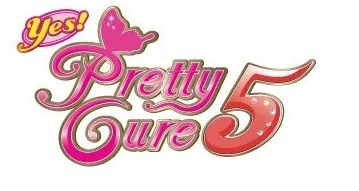
Yes! Pretty Cure 5 Review
The second Finale review and as the cast is bigger, I'll rank the Cures in preference order over actual appearance order... the bar is low for this series mind you but I'll try not to be bias and stay impartial. I dunno how this series ever gave the impression it was ever its biggest way back then???
I can't the positives are few. The plot is at least consistent, it doesn't take and sudden u-turns into something else at any point. It could have done more to show the Pinky hunt, they only did a couple and then it's never spoken of until they need the last couple to complete it? Coco and Nozomi makes things awkward through out, Milk and Nozomi make things difficult to watch or at least mute the darn think, meanwhile Rin and Karen pettiness is just exhausting but at least that one does seem to get some sort of resolution/ middle ground. Coco and Nuts though do make a good tag team/duo though, even if their actual relationship isn't clear. Nightmare weren't too shabby though, the harsh, cruel business structure was a good foil to the Precure ideals of this series and the progressed as the Precure evolved, it was a good alternative than just giving them a power up, you just worked your way up the corporate ladder instead. On the other hand they are on the whole the weakest link when looking at the full picture because everything they do is for Despariah, the problem there, Despariah's goals don't contradict or hinder the goals of Coco/Nuts & co. To make it worse, Despariah's actual wish for the Dream Collet is as cliché and unimaginative as it gets...and has absolutely squat all to do with the theme of the show. It wraps up with a nice little bow... so tidily, it has no impact. I've got nothing, this series was just flat out weak.
⋆ ˚。⋆୨♡୧⋆ ˚。⋆⋆ ˚。⋆୨♡୧⋆ ˚。⋆⋆ ˚。⋆୨♡୧⋆ ˚。⋆
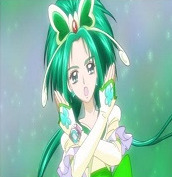
Cure Mint/ Akimoto Komachi Komachi came out of no where really but the last stretch of eps, really made her stand out and in ways actually relatable. Her relationship with Nuts likely helped here but her character focus eps, weren't just about her writing, it helped build her up and the fact she persevered on her stories throughout, no matter how many times they were rejected, is commendable. There was a storm underneath that calm, quiet surface of hers.
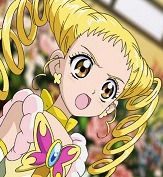
Cure Lemonade / Kasugano Urara I told you the bar was low, I am not a fan of Urara on the whole, she's very clingy to Nozomi, she's scarcely branched out to the other members of the team and I honestly don't understand why she's a Cure in the first place, after all, she's already achieving her dream. She does however get the most exploration outside of the team, between her family, manager and work in general, so at least she got some semi decent focus and her Curry ep was a decent one.
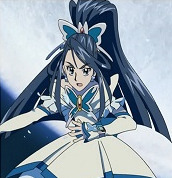
Cure Aqua/ Minazuki Karen Here's a fall from grace, compared to the midway reviews. I did like Karen, her faliure to become a Cure first time, being the voice of reason and only one to ever call out Nozomi, despite backtracking a mere minute later. Unfortunately, after her first appearance and a chance a brilliant mini arc, she got nothing all series, aside a petty feud with Rin and one really snazzy looking, unique battle and one quite sensible process on her deciding on wanting to become a doctor.
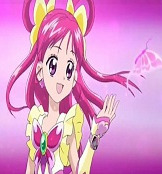
Cure Dream/ Yumehara Nozomi Shockingly, she isn't last, one is just some what more iffy than Nozomi is annoying. The problem I have, Nozomi is a horrid character and at no point does she get better and I stand by that but egads, nothing is more than annoying than everyone taken the blame for her and never letting her take responsibility. Yet, they get so close to addressing this on multiple occassions and just shrug it off with another excuse. On the other hand, Cure Dream is a decent leader, she inspires the team, she can rally them together, it isn't all about her (ish), it's as if another personality takes over.
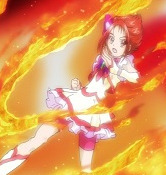
Cure Rouge/ Natsuki Rin If it isn't her dumb, pointless fights with Karen, that seem to come and go, depending on the mood of the writers, it's her creepy mother coddling of Nozomi, it's just too much. For best friends, the show scarcely showed it. I genuinely recall very little else about her if it doesn't involve Nozomi and she did get some unusual character eps to, so it is odd.
⋆ ˚。⋆୨♡୧⋆ ˚。⋆⋆ ˚。⋆୨♡୧⋆ ˚。⋆⋆ ˚。⋆୨♡୧⋆ ˚。⋆
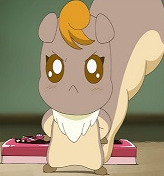
Nuts - He's the only decent one, this isn't much of a contest. Yes his arc was busted in his first ep appearance, they did manage to expand on it slightly, despite constantly changing it every chance they got and being the shows emotional manipulated punching bag. However, his honesty and hate for lies, along with his developing friendship with Komachi over the series are some of his positives.
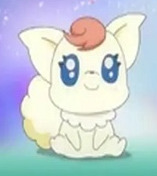
Coco - Really is a case of which is the worst of the pair and they are bad for different reasons. Coco's relationship with Nozomi is painfully forced straight out the gate from their encounter in ep 1 and then, to top it all, he becomes her teacher and it all gets rather creepy from there. On the other hand, his teaching skills are his saving grace and despite it all, is a positive role model for Nozomi in that regard.
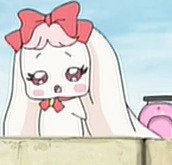
Milk - One would start to think Nozomi can bring out the worst in other characters. Milk's constant bickering with Nozomi is painful to watch. It is dumb, it is petty and we don't need a second act, we already have two characters covering this. I assume, Milk gives Nozomi such a hard time due to jealousy, it's never actually explained, nor is that weird suitcase she's always carrying around. Seriously, what's in it that she can't let it out of her sight?
⋆ ˚。⋆୨♡୧⋆ ˚。⋆⋆ ˚。⋆୨♡୧⋆ ˚。⋆⋆ ˚。⋆୨♡୧⋆ ˚。⋆
Best:
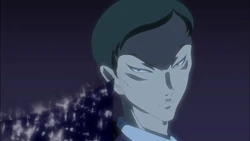
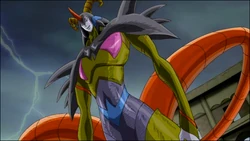
Kawarino -Not as wasted as Bloody was but I'll still give it to Kawarino. The voice is just so off putting, it makes you feel uneasy every time he speaks (so kudos to them on that one), plus on top of that, he's a manipulative prick who uses everyone as pawns (... good gravy it is another parallel) who ironically falls into despair after Despariah's change of heart and all he's done being for nothing, which lead to him being captured by Bloody for a rather fitting comeuppance. It is a pity we didn't get to see him in action more.
Worst:
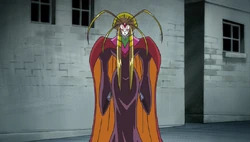
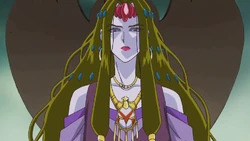
Despariah - This series has a list of forgettable or just wasted potential villains but I've got to give it to the EB, while yes she had a presence through out, she was built up to be some rather fearsome, scary figure and in the end, we got this... A walking cliche, cookie cutter villain with an unimaginative wish that does nothing to thwart the other side. Heck even attacking the Palmier Kingdom seems pointless on the whole and more so done because they were bored. Bloody said the company was different before but we never got to see this, outside this throw away line. Despariah was just so, so underwhelming.
⋆ ˚。⋆୨♡୧⋆ ˚。⋆⋆ ˚。⋆୨♡୧⋆ ˚。⋆⋆ ˚。⋆୨♡୧⋆ ˚。⋆ Fave attack this series: Cure Dream - Crystal Shoot (I can do impartial)
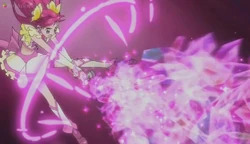
#pretty cure#precure marathon#anime screenshots#precure#yes precure 5#cure dream#cure rouge#cure lemonade#cure aqua#cure mint#milk#coco#nuts#nozomi yumehara#karen minazuki#akimoto komachi#urara kasugano#rin natsuki#despariah#kawarino#finale#finale week#series review
3 notes
·
View notes
Text
Essential Avengers: Avengers #311: The WEAKEST POINT
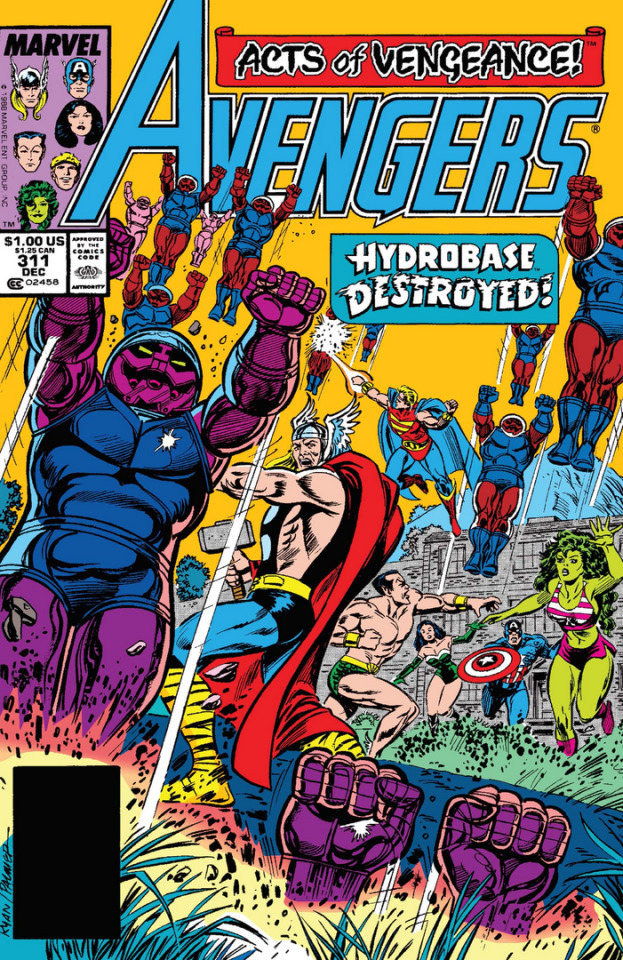
December, 1989
Hydrobase DESTROYED!
Right from Atlantis Attacks to Acts of Vengeance?
Ugh. Marvel really was trying to shake all the quarters out of its audience in 1989. And then the trends of the 90s with special covers and new number one's galore? And then bankruptcy because the big comic companies had poisoned their own waters with that kind of behavior?
I'm getting ahead of myself.
I covered all of Atlantis Attacks because the Avengers and West Coast Avengers chapters wouldn't make any sense in isolation.
I am NOT covering all of Acts of Vengeance.
I counted 50 participating issues before I gave up! That is so much! And it's not really an overarching story so much as... like a vibe? A vague theme?
Villains attacking people they don't usually villain because some masterminds think that would give them a better chance of winning.
A flawed premise because in Marvel, the idea of a strict rogues gallery is a lot more loose. Since a huge chunk of the superhero populace operates out of New York, everybody just kinda shares.
I mean, sure, some of the match-ups that took place in Acts of Vengeance were unlikely. But they were match-ups that could have eventually happened just because Superman Doesn't Stay Out of Gotham in Marvel, if you catch my point.
As the bridge between all of Marvel, the Avengers are pretty likely to eventually fight anyone.
Anyway, I'll only be covering the Avengers and Avengers West Coast. If I try to cover everything I will die.
Also, I covered Atlantis Attacks first because Hydrobase/Avengers Island shows up in it and then (spoilers) it gets destroyed here in issue #311.
Remember how I kept saying enjoy the island while you could?
Yeah...
;_;
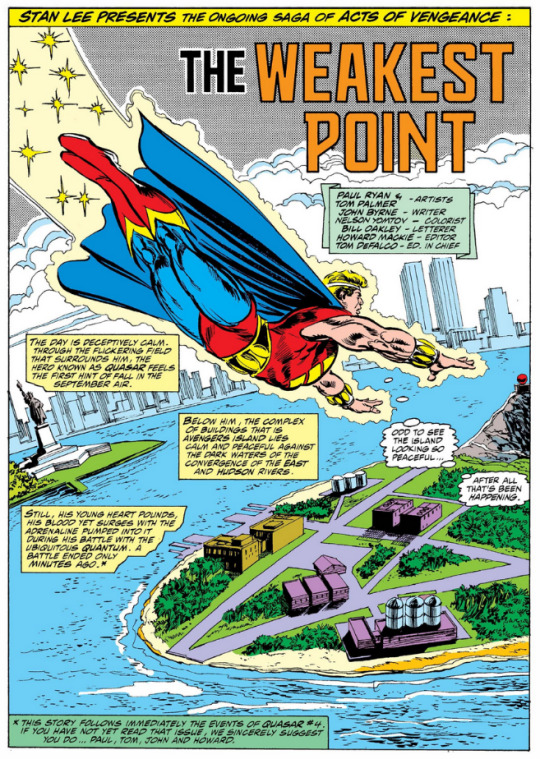
Look at Avengers Island in that opening splash! The runway and roads form a sorta A shape. That's just cool!
That's the coolest the island has ever looked because other aerial shots have been pretty barren or have only showed the Avengers Mansion.
Sadly, Avengers Island never really got a chance to shine. Introduced by Stern before he got unceremoniously booted by editorial meddling and barely utilized by Walter Simonson since his run barely got off the ground. John Byrne seemed like he was going to do something with it when his run started because he had the island moved closer to New York and renamed from Hydrobase to Avengers Island.
But it got hoisted out of the sea (somehow without being majorly damaged) in the Lava Men trilogy and then wasn't really important in the Gilgamesh Is Dead trilogy and now here we are where (spoilers) its going to be destroyed.
I'm jumping the gun a little bit to eulogize but it's been a recent them of the Avengers books that interesting ideas just don't get a chance before they're taken out back and shot.
Captain Monica as the chairwoman of the Avengers. The Worst Roster. Avengers Island.
There's always someone smacking the book and yelling at it to stop trying new things.
Anyway. My unending sadness aside, this is a Quasar focus issue.
I'm not really sure when he became an Avenger because he just started showing up as one when Cap announced the Every Avenger Is An Avenger roster. So either sometime in another book or he was just nearby when Cap was gathering people and got included to pad out the numbers.
(Apparently, there was a back-up story in Avengers Annual #18 set between Avengers #303 and 304 showing that Quasar got invited to join after the Super-Nova incident. Captain America and Hawkeye fight over him. It sounds like a fun story. But I read Avengers Annual #18 for Atlantis Attacks and sometimes back-up stories are omitted on Unlimited and whoops this is one of those times.)
Quasar shows up at Avengers Island after participating in another Acts of Vengeance over in his own book.
Speaking of ideas that never really got a chance to shine: the Avengers Support Crew finally show up!
With the Avengers getting a whole island as their headquarters, some noise was made in Simonson's run that they'd be hiring more of a support crew than just Jarvis. Mostly characters from Captain America's orbit.
But with Simonson leaving the book, not a lot was done with that idea. Until now! The very issue that the new, bigger headquarters they were hired to help with is going to sink!
Hahahaha ;_;
Anyway. We have Robert Frank Jr - Nuklo from Giant-Size Avengers #1. Son of the Whizzer and Miss America (not the modern one). He was cured of being excessively radioactive and got hired to be a groundskeeper on Avengers Island.
We have Peggy Carter. I don't need to explain Peggy Carter. She fought in World War II and was Cap's sometimes girlfriend. Then he started dating her niece instead. Which is a very normal thing to do, probably. She was hired to be in charge of telecommunications.
There's Fabian Stankiewicz. Good ol' Mechano-Marauder! That dingus that kept building robot suits to attack the Avengers and he was treated as a bit of a joke villain? Even getting beaten once by David Letterman. Yes, David Letterman. Cap saw potential in him anyway and hired him to maintain and improve the Avengers' technology.
There's M'Daka, a Wakandan pilot that delivered Captain America a new shield once. And apparently this made such an impression on Cap that he poached the guy from T'Challa to work for the Avengers as a mechanic.
Michael O'Brien, the former head of security for Project PEGASUS and later the Vault and was hired as head of security for the Avengers. Given the stuff that happened at Project PEGASUS and the Vault, I don't know if he's great at his job. But also the Avengers aren't great at security sometimes so its a lateral move, at worst.
Jarvis, of course, is on the payroll as butler and delightful human being. I assume he gets paid extra for being so delightful.
Keith Kincaid, husband to Jane Foster, was hired as a doctor so the Avengers wouldn't have to rely on mysterious Doctor Donald Blake just showing up whenever there's a medical emergency. And presumably to make Thor feel bad whenever he has to look at the dude that married his girlfriend because his dad made them break up.
There's also Donna Maria Puentes, a South American revolutionary that impressed Captain America with how good she was at shooting Nazi androids. So he hired her as an administrator.
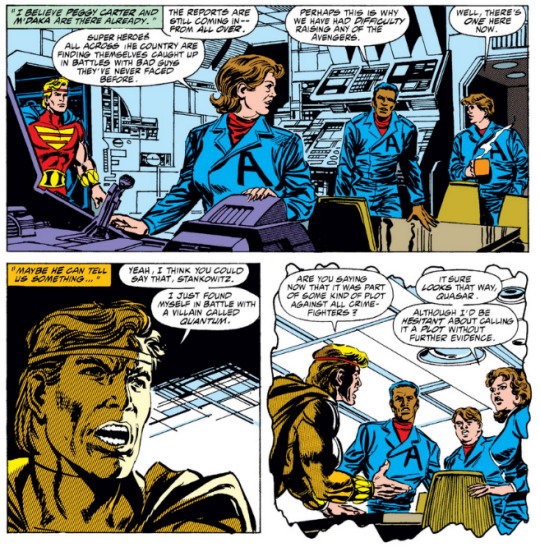
Take this with a grain of salt because I'm also the person looking forward to the Avengers' 90s team jackets but I think the blue jumpsuits and red turtlenecks are a very spiffy look for the support crew.
I honestly like the idea that as a bigger, more officially recognized super-team, the Avengers would have a support staff. And since security is very hard for superheroes, it's mostly people that Captain America already knew.
This issue really goes into some depth about how Avengers Island normally operates. There's guys doing landscaping. There's guys in a security room spotting Quasar arriving and making sure the system confirms his arrival via retina pattern and fingerprints. Then they watch him as he makes his way through the Mansion towards the communication room.
When he gets there Peggy Carter tells him that she's getting reports from all over that superheroes are getting attacked by people they've never faced before.
She won't call it a plot without more evidence but she definitely is thinking the word plot very loudly.
Elsewhere, a mysterious (Loki) man in a suit sits on a throne flanked by two fancy braziers (it's Loki) spying on the Avengers' communication room with magical scrying (Acts of Vengeance plays this up as a mystery but it's Loki, you know it, I know it, and he knows it).
Definitely Loki meets with a mysterious green cloaked figure (Dr Doom, obviously) and ... Shredder from Ninja Turtles? Or maybe the Mandarin? And there's a lot of Everything Transpires How We Planned and yeah we're definitely all going to try to betray each other between them.
Definitely Doom says that he's set in motion his part of the plan.
Anyway, Peggy Carter just finishes telling Quasar that she hasn't been able to contact any of the other Avengers when Avengers Island starts to shake.
Peggy checks on the security monitor and OH NO

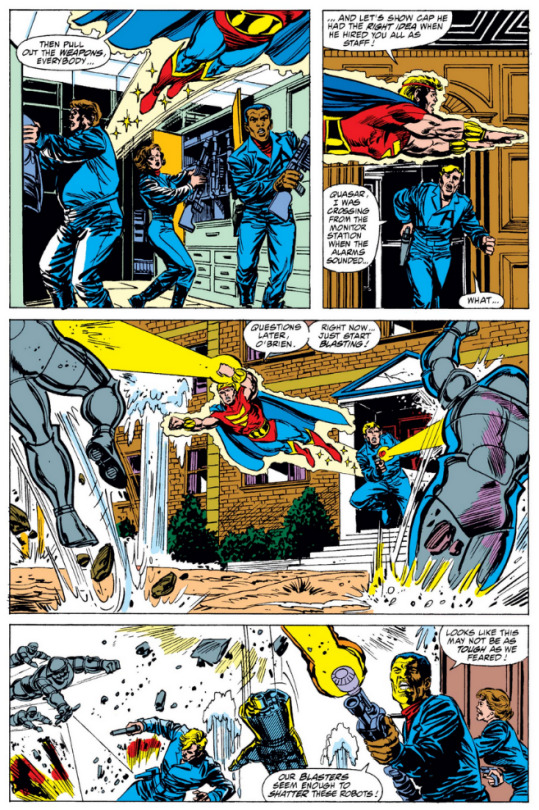
Dozens of robots are smashing holes in the flotation cushions that keep the not-an-island Avengers Island floating!
Since it's just Quasar and the support crew (despite the lying cover featuring Thor, Namor, She-Hulk, Sersi, and Captain America! That's a lot of lying, even by cover standards!), it's an all hands situation.
The non-superpowered people all grab laser rifles from gun lockers, Fabian gets into his latest battlesuit, and Quasar flies out and starts blasting robots.
I'm of two minds here, re: the Acts of Vengeance conceit.
The Avengers have fought Doom before. He's not showing up personally, just sending some robots. But I think it counts. So Doom attacking the Avengers with robots isn't a match-up they haven't had before.
But most of the actual Avengers are off busy somewhere. I don't think Quasar has fought Doom. So Quasar and the Avengers Support Crew versus some Doom robots that aren't Doombots is a novel match-up.
The support crew and Quasar blast the bots to pieces but the disembodied limbs keep attacking.

Rocket punch!
That ol' Doom sure knows how to build a robot.
Even as the support crew and Quasar blast bots, more continue to punch holes in Avengers Island.
MEANWHILE, SPACE.
Which is a thing you have to say when reading comics.
Starfox sneaks aboard Nebula's spaceship to find out what his supposed grandniece is up to. He pleasure zonks a guard unconscious and steals his environment suit so he can be INCOGNITO.
He finds his way to the bridge where Nebula and her Rigellian minion Gunthar are looking over the tablets they recovered from Omicron Seti, which hold in their ancient carvings A SECRET THAT DETERMINES THE FATE OF THE UNIVERSE. A secret that will make her scarier than Thanos.
But she'll need Paul Harker, that random old man scientist the book has kept cutting to. The one who blew up his own basement with his new invention? That guy.
The one subplot the Avengers book has been dutifully building up.
Back at Avengers Island, the support crew is getting overwhelmed. Even Stankiewicz in his battlesuit.
BUT DAMMIT THEY WON'T GIVE UP. THEY HAVE TO PROVE THEY'RE WORTHY OF CAP'S TRUST!
Wow. Cap picked well. These guys really want to live up to what he saw in them.
Quasar sees some of the robots messing with the big Quinjet fuel storage tanks but he's able to chase them away pretty easily. Too pretty easily...
But he literally doesn't have time to worry about that.
He sends Peggy Carter to go back to the communications room and try again to contact the Avengers. Despite Peggy telling him the emergency signal has been going since the attack started.
Peggy worries that the Avengers are already dead, since she wasn't able to raise them before the attack. But she's not going to think about it!
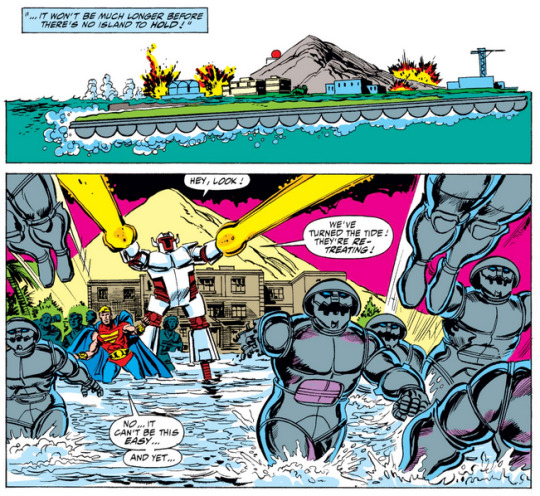
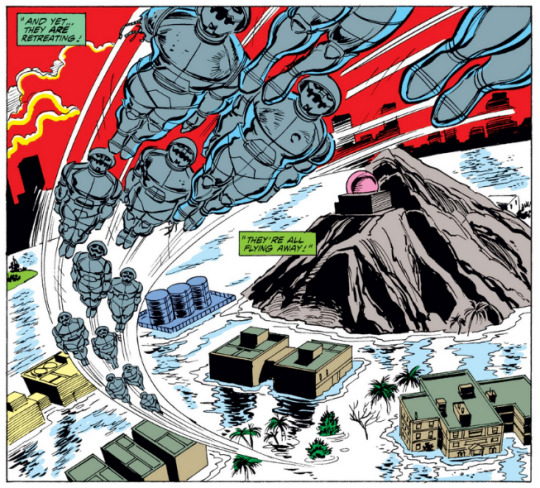
The robots retreat but the island is already sinking.
Quasar doesn't know whether this is a trick or not but he decides to use the breathing room anyway.
He orders an evacuation and orders the support crew to try to prepare as many of the Quinjets for launch as they can reasonably save.
Then he dives into the water to check to see if Hydrobase Avengers Island can be saved.
And. No.
No, it can't.
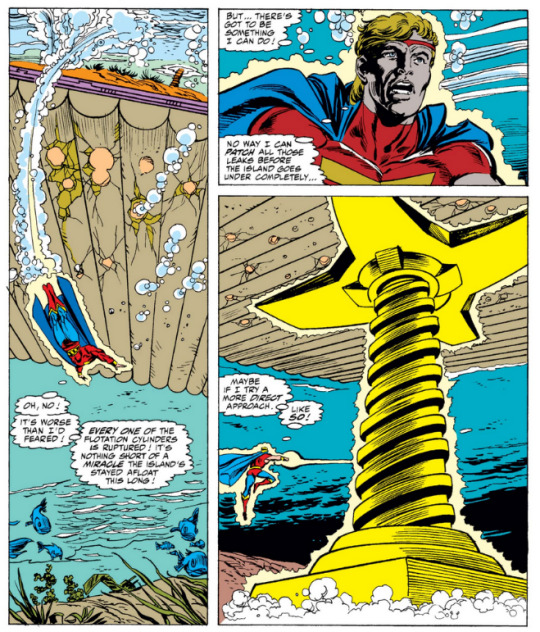
Every one of the flotation cylinders has been ruptured and has taken on water. There's just not enough time to patch all the holes before the island completely sinks.
Quasar does create a giant brace with his green lantern-ish powers to stabilize the island.
I wonder why he doesn't make a jack to lift it completely out of the water. He's thrown an entire Terminus into space once.
For that matter, weren't giant spikes put into Avengers Island to keep it in one place? Where are those and wouldn't they help keep the island afloat?
I guess that got lost in the shuffle.
O'Brien rushes into the mansion (where the flooding is ruining all of Tony Stark's art and rugs) to look for Peggy Carter. Who you may recall was sent back into the Mansion to try to contact the Avengers despite an automated distress call going out.
Way to manufacture drama, Quasar.
Peggy insists at staying at her post, continuing to try to contact help. Like she thinks she's on the Titanic or something. But O'Brien lies and says that the Avengers are here so c'mon lets hustle.
Then the secret bomb that the robots secretly left at the fuel tanks unsecretly explodes.
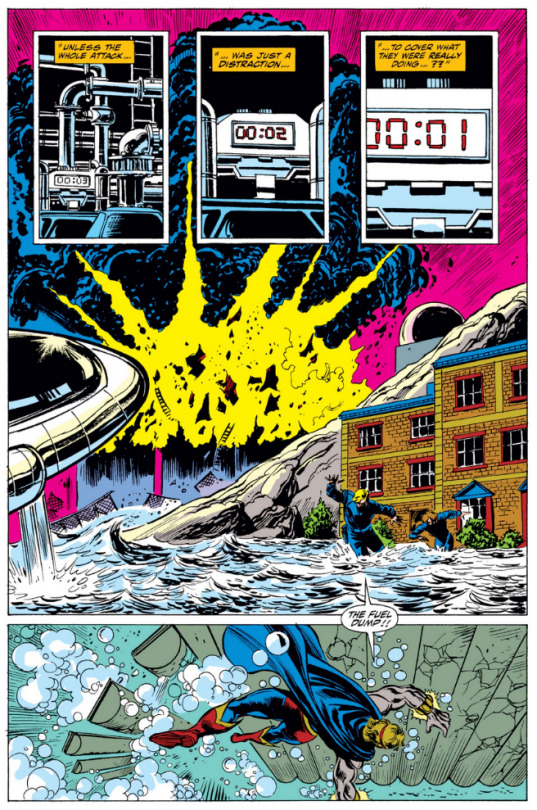
Knocking Quasar for a loop and rendering his plan to stabilize the island moot.
There's just no chance of saving the island now.
But Quasar does pop out of the water to save O'Brien and Peggy and carry them to the Quinjet Jarvis is piloting.
Hi, Jarvis!
Jarvis: "I only wish we had never removed our headquarters from New York City. Then, perhaps... nothing like this... could ever have happened. The proud history of Avengers Mansion would not have ended like this..."

Jarvis, I love ya, but shut up. You sound like you're speaking from the editorial, not from the heart.
Don't forget that y'all moved to the island in the first place because the Masters of Evil basically gutted Avengers Mansion. You might as well say 'I only wish we'd moved out to sea earlier so nothing like this could ever have happened' about that.
And like I said at the beginning of this post, Avengers Island was not a mistake. It was a new direction for the book that never got a chance to shine before someone lost their nerve and forced a change back to status quo.
Because, yes, before too long, Avengers Mansion will be rebuilt back in Manhattan.
And I like Avengers Mansion. Honestly, it's my favorite HQ for the team. But I wish this era wasn't characterized with timid backtracking.
Aside from that, this is a cool issue. Seeing the civilian support staff and Quasar have to defend the base while the Avengers are absent is pretty interesting.
I disagree with the sinking of Avengers Island but it does give Acts of Vengeance some impact. Although it can't compare to the last big HQ wrecking, Avengers Under Siege.
Anyway. Quasar says he gets the feeling this whole thing isn't over. And he's right. There's two more Acts of Vengeance in Avengers and three in Avengers West Coast.
Four in Avengers Spotlight but I don't read that. It says Avengers on it but it's like Two-in-One or Marvel Team-Up but with Hawkeye.
Follow @essential-avengers. Like and reblog. Shout to the wind. Howl like nobody's watching.
#essential avengers#avengers#Acts of Vengeance#Doctor Doom's robots#Quasar#Avengers Support Crew#Robert Frank Jr#Peggy Carter#Fabian Stankiewicz#Mechano Marauder#M'Daka#Michael O'Brien#Edwin Jarvis#Keith Kincaid#Donna Maria Puentes#Starfox#Nebula#cool issue i just disagree with the plot direction
5 notes
·
View notes
Text
Thought Dump: The Crow

Up to this point, I've been more familiar with the soundtrack, which FUCKING SLAPS, so write that down. I've seen bits and pieces over the years and always meant to watch the whole thing, and I'm extra annoyed it took me so long because HOLY SHIT WHERE DO I BEGIN??? The vibes! The aesthetic! The cinematography! The story! It's all stuff that makes my brain go WHEEEEEEEEEEEEE!!!!
Vibes: angsty, noir-ish, Batman-as-a-broke-musician. The climax of the movie takes place on the roof of a cathedral during a rainstorm, ffs, and if that doesn't tell you all you need to know, I have no more words for you.
Aesthetic: grunge yet goth yet Gothic. It's always dark. It's always raining. The fact that it's always raining has thematic relevance. But everything is also on fire and it's tragic except for when it's awesome. Everyone looks either from Seattle in the 90's or just plain Extra AF™.
Cinematography: duuuuuuuuuuuuuuuude. Aerial POVs, tracking shots, lighting, shadows, colors, it looks so fucking cool. I lost track of what was actually going on a few times because I was too busy just LOOKING at stuff.
Story: very basic and straightforward, but I dig all the bits and pieces. Moody crime drama, tragic love story, vigilante mission, revenge arc, even a nugget of found family for good measure, all with a sprinkle of the supernatural on top. I'm assuming the comic this is based on gets more in depth, as my only beef is that some points feel slightly undercooked. Don't get me wrong, the weakest elements still get the job done, and as of now it's still a minor complaint. First-viewing me is more than happy. (Though Tony Todd is underutilized and that's a damn shame.)
Full disclosure, watching this with the knowledge of the real-life tragedy of its making did something to the experience. I can't quite put it into words at the moment, but the movie's theme of living on after death landed quite a bit differently than it might have otherwise.
Final thoughts: 9/10, will probably rewatch in the very near future if I know me, and definitely will not be shutting up about it anytime soon.
0 notes
Text
I’m gonna talk about this in more detail, it’s possible that the ending will change my mind but I have opinions right now. Spoilers ahead if you care about those.
So the root of my grievance is that, for as weak and contrived as the base game’s story could be (I consider it the weakest Xenoblade narratively and it’s not even close), everything was thematically cohesive. This was a story about humanity’s struggle to survive and find a new way of life on a strange new planet. Even the insane twist at the end, that the Lifehold’s database has been destroyed since the White Whale crash-landed and yet somehow everyone’s consciousnesses are still active in their mimeosomes, contributes to this theme; Like it or not, humanity has to adapt to a new way of existence.
And this ties into the way the player has been approaching the game! Exploring and mapping out Mira is something the game measures and requires for progression. You the player have to learn how to navigate through or around dangerous territory. For the whole runtime of this massive JRPG, you are learning how to play by Mira’s rules so that you can survive and maybe even thrive.
And then the plot goes “whoops, sorry, Mira is getting erased from reality, time to evacuate”
We aren’t digging into any of Mira’s quirks. We aren’t going to see what humanity does when it finally has a shred of stability. None of that, Mira’s over, we’re packing up and leaving.
And like, the multiverse stuff is sauceless but the only part of it that actually pisses me off is that it’s apparently the reason why everyone is conscious even without the Lifehold’s database. For nearly a literal decade our only hint has been that “It’s something about this planet,” but according to this remaster, it was never anything to do with Mira. And that’s what stings the most I think.
In the base story, Mira is an enigma. It exists on no starchart, not even those of hyperadvanced alien civilizations, to the point that the humans aboard the White Whale didn’t realize it existed until they were crashing towards it. It’s the center of some kind of spacetime anomaly that not even literal time travel can break out of. It’s a universal translator between species with not only totally different languages, but totally different physiological means of communication. And, of course, it transferred the consciousness of every human being who landed on its surface into their remotely-controlled mimeosomes.
In the new story, Mira doesn’t fucking matter beyond being the place humanity happened to end up. Any of its anomalous properties (at least those the narrative continues to dwell on) aren’t actually its properties, but aftereffects of Alois unintentionally punching a hole in reality with the Ares Prime.
It all feels so incongruous. Like whoever wrote the new story focused entirely on the inciting incident (Earth explodes) when outlining the new stuff, and only skimmed the in-game narrative.
And that’s without even nitpicking stuff that doesn’t really matter. The Ganglion were trying to destroy all remnants of Samaar, so why is their object of worship a Samaarian? Why do we see glimpses of all three numbered games in the Rift when XB3’s setting is the settings of 1 and 2 smushed together? Why did Elma wait until long, long after the Earth’s destruction by two ‘unknown alien civilizations’ to tell anyone, including those who knew she was an alien the whole time, that THE EXACT SAME ALIENS DESTROYED HER HOMEWORLD???
I am focusing on big-picture things here, but even small bits just feel like the writers only half-remembered the base game’s lore (which was already haphazard in places) and didn’t bother to refresh themselves.
Just cleared the vanilla end boss in Xenoblade X DE, excellent remaster overall, but I cannot get over Vandham’s voice in the new cutscenes. Like everyone sounds a bit off, but that’s to be expected after 10+ years. But Vandham’s voice is so much higher and shriller, it takes me out every single time. It’s like the new actor just didn’t listen to a single line read from the vanilla game, it’s absurd.
15 notes
·
View notes
Text
Tommy’s character and the theme of failure
One thing I’ve always rather appreciated about Tommy’s story in the Dream SMP is how it explores the idea of failure. It can be a challenging one to do right as it means exploring a character’s weakness a lot and can start to feel unsatisfying if the character never succeeds but I feel like Tommy’s story avoids this issue as his arc is ultimately an encouraging one. His character never stops trying or gives up in spite of his losses, showing the perseverance to keep going until eventually he starts to find happiness, no matter how elusive it seems.
Tommy’s character is no stranger to failure of course but I’d say this theme starts to become prominent with November the 16th. Tommy had two goals: to save L’Manberg and to save Wilbur. He was pretty optimistic about both. And he failed. The day ended in disaster with Wilbur dead, Technoblade, his idol, mocking his heroism and telling him to die, and his home in ruins. It takes him a long time to come to terms with who Wilbur was, separating Wilbur into two in his mind: President Wilbur and the ‘crazy’ Wilbur who blew up L’Manburg.
But Tommy continues on, quietly moving on as L’Manburg gets rebuilt. No matter what, he still believes in L’Manburg; it’s still alive. Also, he wants to finally get his remaining disc back from Dream, feeling the need to do this after putting it aside for so long.
But of course, things don’t go well. That which he had taken for granted, his bond with Tubbo, was under fire. His personal wish to get his discs back was causing division. A simple prank gone wrong was tearing everything apart as Dream threatened L’Manburg once again. None of these things were purely Tommy’s actions, and yet his actions played a part all the same as Dream essentially took advantage of all of Tommy’s weaknesses. Tommy was being viewed as a liability, a troublemaker, as self-centred, as a problem.
Tommy’s character likely blamed himself somewhat for his failure with Wilbur and L’Manburg the first time but it had been out of his hands and his reactions were more shock than being truly broken by the events and he kept up his optimism. Yet this time, the problems were not things far beyond his control. It seemed it was his own mistakes spelling his doom and it impacted him quite severely. As much as he recognised Dream as an antagonist here, his friends distrust of him was his failure. Despite his best efforts, he could not convince Tubbo not to exile him.
Rather than seeing the fairly resilient, optimistic Tommy like the first time he was banished, this time Tommy’s defeated. We see the full effects it takes on his mental state and the narrative does not pull its punches. Tommy’s already depressed and we start to see evidence of suicidal thoughts very quickly. This is all made far, far worse by Dream who encourages his dark thoughts and feelings of worthlessness, telling him everyone’s better off without him while breaking his spirit and making him miserable by repeatedly blowing up his items.
Dream was of course Tommy’s enemy, he’d recognised before that what Dream had been doing to L’Manburg, with the obsidian walls and insisting on banishing Tommy, had been unfair even if Tommy had been helpless to stop him. Yet over exile we see him really start to internalise Dream’s words, starting to really believe that narrative that he is unloved and a liability, despite his best efforts. As his mental state worsens we see him starting to believe Dream’s lies so much that he begins to believe that Dream is really his friend who cares about him. Meanwhile, he’s angrier and lashing out at the people he cares about, we seem him kill Jack, break the bridges he built and generally lashing out at the people he misses the most.
So through exile, we see Tommy at his weakest and most vulnerable. We also see some of his flaws with his uglier side, his uncontrolled emotions, his dependency on others, his deep self-worth issues and how he can be so successfully lied to. This deep exploration of Tommy’s character allows us to really see how the repeated failures and setbacks and losses affected his character mentally and depict it as yet another obstacle he needs to overcome.
And ultimately he does, ultimately deciding to fight back and run away from exile on his own. Tommy’s arc goes to very depressing places but manages to remain an inspiring story by showing you at his weakest and yet also show him never truly giving up but pressing on, in search of that happy ending. Running away from exile has him also realising that Dream is his enemy, not his friend and he commits to fighting back against him.
But of course the narrative doesn’t entirely move on. Tommy’s struggles and failures continue to plague him as the mental issues he has with self-worth and his confused feelings towards Dream do not go away. He managed to continue but that wasn’t the perfect victory as most of his problems are still there and he’s still the same person. at Techno’s house, we see him and his confusion. He’s lighthearted and joking about but he’s still deeply troubled without a clear stance on Dream or L’Manburg or Tubbo and he clings to the idea of the disc as a simple goal. It seems as if he’s doomed to become the person he hated or make the same mistakes again. He once failed to save Wilbur and it seems as if his greatest failure would be to go down Wilbur’s path too, blowing up the country he once loved.
And Tommy nearly goes too far. He finally meets Tubbo again and his anger, his issues all come back as does some self-centred behaviour as he declares that ‘the discs are worth more than you ever were’.
And he immediately regrets it. He apologises, he turns around and gives them up to Dream. He won’t let himself turn into Wilbur.
And yet, every little victory he fights so hard for is met with an even greater failure. He switches sides on Technoblade while giving Dream exactly what he wanted. His story isn’t a happy one in spite of him trying his very best and making the decisions that are right for him. And we can only wonder how inevitable it was or if he could’ve done better for he hurts Techno deeply. Is he doing better or does his very nature doom him to make the same mistakes again and again?
Once ore, we see L’Manburg blown up and this time Tommy declares it a lost cause. Despite his best efforts, it’s over and we can only stare at the ruins of the nation he’d once helped build with Wilbur. Additionally, Tommy is dead to Techno now, that relationship seemingly broken forever.
But it’s not the end. Tommy is defeated once more, with each failure hitting harder than the last but he doesn’t give up. He keeps on fighting. For all he’s lost, he’s won Tubbo back, and the experiences may have been terrible but he has learned something through all of it. Even if all that is, is understanding suffering a bit better and getting back the courage to apologise and reconcile.
He and Tubbo go after Dream and it’s almost, almost too late. He’s nearly locked in prison forever and Tubbo almost killed.
But it’s not end. Just this once, it’s not a failure. They bet it all and finally had that victory. The rest of the server comes to save them and Dream gets locked in his prison while Tommy and Tubbo are finally free.
Course, Tommy’s story isn’t over there. And the thing with this theme of failure is that it keeps on cropping up. They may have finally gotten a victory but Tommy’s issues aren’t over. he tries to start again, building his hotel but the trauma from exile has made an impact on him. It’s something that can’t be solved in a day, but only over a long time. And despite everything, the issues keep coming back. Tommy feels like things are unresolved with Dream and visits him again.
And he gets locked in prison and dies and then gets resurrected. And its all absolutely devastating and it seems as if Tommy will never get better, that he’ll never truly have his happy ending. His hotel gets stolen from him and its as if everything he tries to do ends in failure.
He tries to sort things out, tries solving things with killing Dream and it just gets Ghostbur killed and the guilt can only eat at him. Wilbur is back at Tommy’s afraid but time has passed and he’s starting to see Wilbur more for who he is. After all he’s been through, he understands him way better than he did before. He once more commits to helping him but Tommy isn’t the naive kid he once was.
Tommy still lives in the very same spot he always did. He still wants the same things he always did: a home, security, peace, friends, and he’s been experiencing many losses. And yet, his story is not a hopeless one. Because in spite of all that’s happened, he’s still trying again. And he’s learned and can avoid making those mistakes again. Right now, he’s doing better, he’s committing to living peacefully in a way he hasn’t in a long time. He’s been attempting to build bridges and though all his failures haunt him, he is gradually healing day by day, still trying to find that happy ending.
I think Tommy’s story is very cool for the way it really explores these themes of failure. It does not pull its punches, its dark, never easy or straightforward but that’s also what makes it so powerful. Those bright spots, feel so good, they feel so rewarding because they were so hard-fought. We root for Tommy’s character because we’ve seen his journey and really feel he deserves his happy end even though its never going to be perfect and indeed every failure is a mixture of forces outside of his control and his character which he has been trying to improve, learning to be nicer, more forgiving and more aware of his own emotions. He can’t fix Dream nor does he know how best to help Wilbur but he can help himself and that’s what he’s always trying to do. He holds himself to account and always tries his best.
#tommyinnit#meta#analysis#dream smp#long post#finally got round to writing this#dream smp meta#heh i blame the music i was listening to#ive been thinking about this subject a lot but suddenly listening to this song called 'the same mistake' one too many times#and i finally wrote my thoughts out#this is mostly from his character's perspective if it sounds like im blaming tommys character a lot here#he's biased ofc - he's just trying his best and didn't deserve the consequences he received#aaah a lot of characters on the smp have failures but i like how tmmys really toy with the ideas of failure a lot#i love character who never give up no matter how many times they fail a i find it super encouraging#so yeha i do love tommys character
202 notes
·
View notes
Text
Otaku
[Bakugou + Todoroki] are in love with the anime character [Name].
A/N: Gender-neutral reader Crackish??
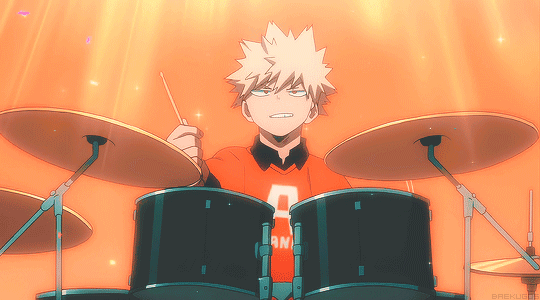
Bakugou Katsuki:
He’s sort of picky with the genre, be it fantasy, horror, shonen, but his favorite character has to be a super cool, super powerful one. No excuses.
You know, the type of anime character that’s probably introduced through a silhouette of them posing dramatically with their notorious group whose image is teased throughout the first few episodes/seasons.
He goes pretty hard for All Might, and he’s definitely the same for your character.
Reads the manga (but he buys it super secretly, like in a hoodie at night and the cashier probably thinks that they’re being robbed until he brings the entire [Series] collection to the register). Watches the anime the moment it’s broadcasted, reads metas and watches youtube videos that talk about conspiracies/analyses of your character.
NO ONE CAN KNOW THOUGH.
He’s taking his anime phase to the grave.
For some reason gets super aggressive when you’re being flirty or being shipped with another character?? He hates all the scenes that tease any potential romance between you and other characters. asdfgj He’s like, “No one is good enough for [Name]!!! Except for me.”
He even tries to think up ways he can legitimately square up with them LMAO. Like he wonders how he could defeat your potential S/Os in a fight but y’all are like ,,, anime characters SO WHY DOES IT EVEN MATTER LOL
“Three-sword style?? Tch, I’d fucking blow that bastard to bits.”
“Who’s this Gaara of the Sand looking ass and why is the author getting so bold.”
He even tries to think of how well your abilities match up with his own Quirk, this dork.
THE LENGTHS HE WOULD GO FOR YOU.
If you were a real life person and your dislikes are lets say spicy food or loud, overbearing people, Bakugou would be like, “Tch I’m right, they’re wrong. Shut the fuck up!!!” But if his ultimate wifu/husbando has those dislikes he would be like, “Omg...😳😳 opposites attract...👉👈”
He honestly tries to be a low-key fan (as in, not be a fan at all to outsiders), but if one day during class Kaminari ends up saying that in [Series], you’re the weakest character in your group/squad, Bakugou would get super angry.
“Hey, Dunceface!! It’s so fucking obvious that you’re an anime-only fake fan, so don’t talk as if you know shit!”
Bakugou is those “um actually” ;; fans
Bakugou is a manga reader, so by the time your introduction scene or Ultimate Attack scene is being aired he becomes super OOC. He’s hyped for it for days, incredibly nervous at how the animators handle the scene.
By the time he watches it??
THE ANIMATION!! THE VOICE ACTING!! YOUR COOLNESS!!! PLS ORA ORA HIM IN THE CHEST!! HE’S BEGGING YOU! IF YOU’RE GOING TO UNISON RAID WITH ANYONE PLS LET IT BE HIM!!
He’s legitimately sweating buckets by the time the episode is over. A whole-ass fire hazard.
Probably knows how to play your character theme on the drums.
Omg but if your character dies/is hinted toward dying/or the most recent chapters ends with a cliffhanger where you’re fatally injured he will become legitimately depressed.
Like holes himself in his dorm room for a whole day without contacting anyone and with the blinds drawn type of depressed.
When he comes to class the next day with eye-bags and is slouching and his classmates think that something horrible has happened, it’s probably only Izuku who knows what’s going on.
He’ll say, “You’re upset about the most recent chapter of [Series], right? I know it must be hard for you right now.” He’ll give Bakugou an officially licensed rubber strap of your character and Bakugou will just ;; cradle it in his hands softly.
In complete seriousness, your character is probably someone who is strong physically, but publicly rallies for things like, “Failure is fine.” Your character arc would probably explore what it’s like being not good enough or feeling constantly disappointed, so he feels comfort in your character.
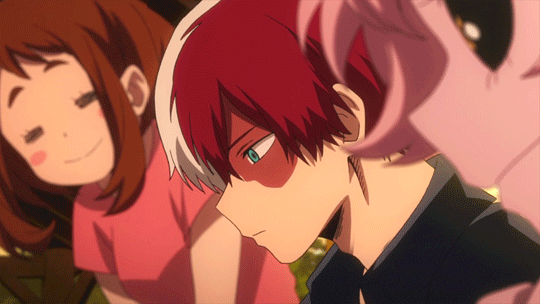
Todoroki Shoto:
In comparison to Bakugou, he’s probably a more low-key fan unintentionally, but goes just as hard.
Buys all of the merch, limited-edition or not, has your picture set as his phone lockscreen and homescreen, has a little acrylic charm of you on his phone, follows several fanartists that draw your character on social media. He buys enough merch that his room looks like a glorified shrine.
It’s canon that he reads manga, but I headcanon that he’s even less picky with his genres and willingly reads things like slice-of-life or shojo all the way to shonen or adult fantasy, so your anime could come from any possible story.
Your character is probably someone who is sweet and kind but has a traumatic character backstory.
He probably ends up thinking stuff like, “If [Name] was with me, I would never let them get treated like that.” asdhj he’s a dork too.
Unironically dramatically quotes you during battle and thinks that it’s still badass because he’s a teenage boy in his anime phase.
Doesn’t get into debates with people who don’t like your character. He’s like, “Everyone is entitled to their own opinion :)) even though they’re wrong. >:(.”
If you’re from a sports/competition anime he’ll try to learn all of the rules, and even try it out for himself (if it’s not fighting) but he finds out that he’s... not very good at it. That doesn’t make him any less amazed though!
If your character is from a different culture with different customs and traditions, he’ll even learn more about them outside of your anime!
Forces his siblings to watch the anime with him. They don’t necessarily have to, but the Todoroki household has one big TV and he hogs it all the time watching your anime over and over.
Natsuo is begging him to watch something else and Shoto will just pout angrily from the other side of the couch.(  ̄^ ̄)
It’s so jarring because he doesn't look or appear like a hardcore anime fan, but sometimes he’ll just butt into conversations randomly and talk about you.
Like you know those tumblr Naruto posts that talk about it as if it’s some sort of Renaissance literature. That’s Todoroki.
[”Man, they’re so hot--!”
“You want to see someone hot?” Todoroki asks with a perfectly straight face, and he’ll just... turn his phone around and show them a picture of an anime character.]
When his dad tries to set him up with someone else: “You think they’re my type? Do they watch [Series]? Do they know what true friendship is?? Do they understand pining and love the way [Name] does?”
Endeavor: who the FUCK is [Name].
Gets into fanfiction because of your character and series. He’ll just be reading on his phone during break times at school and everyone thinks that he’s being so well-read but he’s just reading pure smut with a straight face.
Doesn’t mind when you’re shipped with other characters necessarily but he is super picky. If your character is hinted toward a potential romance with another character that’s pretty crass and doesn’t necessarily treat you well but you’re sticking together through the power of friendship, he won’t ship it.
He’s just like “[Name] would be so much happier with someone else like me.” :////
And if your character goes through something traumatic or terrible during the series he’ll be so sad, like soooo sad. :((( Deku would probably be comforting him on the couch in the common room and everyone is concerned because he looks like he’s mourning a lost pet, but it turns out to be over some anime character pshhhsdfh.
Deku would just be patting his shoulder trying to console him and Todoroki’s just sitting there with a big frown on his face going, [“But they’ve been through so much throughout the anime already...”
“I know, Todoroki-kun, I know...”
“The author can’t do that to them... It’s just not fair.”
“I get it,” Midoriya says mournfully.]
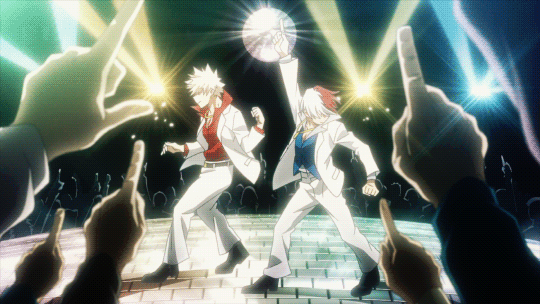
Plot twist: They like the same anime character
They’ll probably find out when they have to retake the license exam together.
Todoroki will just take his phone out during off times and Bakugou’s eyes looks over because it’s drawn by the noise but then his head just snaps to the side when he realizes its a little charm of you, like, he’s going to get whiplash from that.
“What the -- is that [Surname] [Name]?!”
Like they have never really hung out together before this, so when they both first realize that their favorite character of all time is [Name] they’re left ,, just standing there ,,, pointing at each other like the spiderman meme.
At first they’re both inwardly excited because FINALLY someone cultured and with taste. They spend the entire time talking about your stats, your attacks, your post-timeskip character design, and your personality, and then they delve a little bit deeper and then they realize ,,, oh.
Bakugou says that you don’t belong with the dumb protagonist, you should be shipped with someone strong, confident and loud, but Todoroki is like noooooo they deserve to be with someone that treats them gently.
They connect the dots.
[“Bakugou, you aren’t compatible with [Name]. It says so in their trivia page.”
“Says you! They won’t want some bland-ass pretty boy! They would want a real man!”]
They’re such fanboys ;;; they do realize that you aren’t real, right asdfghj?
One day Kaminari and Sero separately invite them to an anime convention, but they both say no and that they have plans or “something better to do” that day.
Then Bakugou and Todoroki both turn up to the convention at the same place because they both reach for the last limited edition [Name] figure and they just stare at each other wide-eyed (ʘoʘ╬) like that.
They start verbally fighting each other over the last figure and then physically fighting each other andddd then they get kicked out of the convention.
Izuku ends up swooping in and getting the last box.
#todoroki headcanons#bakugou headcanons#todoroki x reader#bakugou x reader#mha#mha headcanons#BNHA Headcanons#my hero academia#bnha#boku no hero academia#boku no hero academia headcanons#my hero academia headcanons#todoroki shouto#bakugou katsuki#midoriya izuku#midoriya headcanons#todoroki x you#bakugou x you#todoroki imagines#bakugou imagines#bnha imagines#mha imagines#bnha todoroki#bnha bakugou#mha todoroki#mha bakugou#i understand that otaku might have negative connotations in japanese culture#but please understand that this is purely for fun
3K notes
·
View notes
Text
Harm reduction or abdication? Balancing power, care, and autonomy in Picard's Federation.
The series presentation of mental health as an unsolved problem and the way it uses characters with questionable mental health within the narrative has provoked a lot of consternation and even backlash. The role of mental health in the narrative is something I discussed previously.
I'm picking back up on that theme to discuss and perhaps over analyze what the Federation's treatment of people with mental illness tells us about its relationship to the individual and to individual freedoms. Implied too is that the Federation of Picard is a place where straight forward solutions to ethical dilemmas we are grappling with today have not been found.
This is part of a series of essays reevaluating Star Trek Picard and interrogating the widely held fandom criticism that Picard made the Federation into a Dystopia.
Balancing Harm Reduction and Overreach:
What do Raffi and Yvette Picard tell us about the Federation and how it understands the relationship of the state to the individual?
As I made a note of discussing the Federation and mental health, Raffi lives alone in a national park and is free to take recreational drugs and be depressed as long as she doesn’t make a nuisance of herself.
When I say she is “free to” I don’t mean that sarcastically either. I also want to be extremely mindful of over emphasizing Raffi’s condition circa season one or be guilty of trivializing the impact it has had on her life. I am mindful of my own position in this as someone outside of the narrative, attempting to analyze a fictional character, with no special training, and even if I did have special training: I am someone who firmly believes in the Goldwater Rule. So take all of this with a medically inadvisable amount of sodium.
The freedom to be angry, depressed, and even self destructive, within reasonable limits, and not have someone drag you off to treatment against your will or make you contribute to society according to someone else’s rubric is a kind of freedom. In ethics and political science, this is often referred to as negative freedom or freedom from. As in freedom from someone else defining your ideal cognition or approach to life.
Raffi’s situation before Picard shows up with his bottle of wine and seduces her with stories of Romulan death squads represents freedom from material want. That’s the post scarcity promised by the techno utopian aspects of the setting, presuming we are humane enough to be happy with equitably shared abundance instead of still seeing a need to hoard and make people jump through hoops to prove their worthiness to exist.
Raffi’s state of affairs as of when we meet her in the present can be read one of two ways depending on your feelings about a number of thorny questions. Maybe it's the state failing her and refusing to take responsibility for her. If you are primarily viewing modern culture in terms of its abdications, this is a very natural lens to see through.
The alternative viewpoint is that it's the state exercising restraint and choosing to set a high bar for denying a citizen her right to autonomy. Raffi may or may not have the capacity to coolly judge the benefits and consequences of treatment in actuality but, from the perspective of the Federation, the presentation of her symptoms is not sufficient for the Federation to make that choice for her. I want to be clear that I am well aware this sort of argument is routinely used to pretend that the denial of basic necessities of life and dignity by the state or a free market is a freedom from unions, state dependency, or any number of "freedoms from" that I regard as disingenuous.
I don’t bring this up to be flippant and to dunk on whichever ideological label you’d like to associate with each side of that argument or whichever side you think makes the weakest case. I avoided labels in the effort to have this part of the conversation taken more seriously.
When a person can be deemed to be no longer capable of making decisions for themselves is among the most important questions a society can ask itself.
Erring on the side of autonomy risks needless suffering, even danger: hence the arguments in favor of red flag laws. Indeed, (season two spoiler) Yvette Picard may have lived had she been subjected to a mandatory mental health screening and treatment.
Although this assumes the Federation has effective mental health treatments that don’t require a consenting patient. Given the emphasis on talk therapy in TNG and DS9, the Federation seems to prefer adaptation and accommodation over medical intervention. Which in turn implies that the brain is a tricksy thing to work with, even in the 24th century.
Erring on the side of safety and the elimination of suffering risks pathologizing people who are suffering from being a poor fit for their environment or the mislabeling of disruptive people to make them conform.
Treating people who struggle to conform as if they have a mental health problem was done previously to women who were unhappy with their assigned social roles, queer people who suffered from being unable to lawfully and emotionally accept the dictates of their natures, and is now the preferred way of addressing children who do not conform to their birth assigned gender in many parts of the United States, including where this author lives.
When mental / emotional suffering is because of circumstance not nature, a society that has no place for people who need a different set of norms may act to correct that suffering in a fashion that enacts a terrible price.
#star trek picard#star trek ethics#star trek mental health#fictional politics#ethical case studies#star trek morality
3 notes
·
View notes
Text
Florence + the Machine - Ceremonials: Album Review
I can't believe how long it took me to do this, considering the fun I had reviewing Lungs. But late is better than never.
As different songs are present and absent on both the standard and deluxe versions of Ceremonials, I've decided to combine the two. That means Breath of Life is present, along with the bonus tracks. However, I've cut out reviewing the acoustic and demo tracks of songs already present on the album, with the exception of Landscape.
With that said, let's plunge in headfirst!

#1: Only If For A Night
This was inspired by a dream Florence had about her late grandmother, in which she told Florence to, ad verbatim, “concentrate on her perfect career”. It’s such a bittersweet, ethereal song that sets us up so well for recurring themes of loss and grief on this album.
For me, this song is so tame compared to the dive of darkness the album takes later — and even though I like the song overall and love the story it tells, I regret to say that although it works as an opening song I find it the weakest one yet out of all 5 albums so far from a musical standpoint. 6/10.
#2: Shake It Out
HHHHHH. I’m sorry. I can’t stand this one. I feel that this is very much the Dog Days Are Over of Ceremonials, but even Dog Days is enjoyable to listen to. Though I appreciate the triumph in Florence’s vocals and the vow to renew and restart herself in the lyrics, I mostly find the production of this one so overblown that it strips the song of its rightful poignancy, and has thus truthfully never struck that much of a chord with me. 4/10.
#3: What The Water Gave Me
Florence said My Drowning Obsession’s Back, Baby!
The subtle rock beat, harp and shivery yet strong, solid vocals inspired by Virginia Woolf really shine here. Though it doesn’t have as huge or overwhelming a sound as compared to some of the band’s other water songs, there’s no doubt that you still feel Florence’s deep, cavernous body of water lapping at your knees as the harp trills and her voice glides over the surface. 7.5/10.
#4: Never Let Me Go
This song always reduces me to tears. I don’t think I’ve any way to aptly express what exactly this song means to me without having a crisis, so here’s the gist:
It’s a love song, a Don’t Forget About Me song, a grief song, a song about someone making peace with dying even though they’d like to stay and heading back to the source of all life — the arms of the ocean. The lyrics and Florence’s delivery of them are so unbelievably beautiful, sad and mournfully heartfelt. The instrumentals all around enhance the melancholy that just consumes you like a wave, and for this reason I can absolutely understand why Florence avoided performing this for the past 10 years. But nowadays I’m genuinely so glad that she’s in a better place than when she wrote this and is willing to perform it once again. 10/10.
#5: Breaking Down
I know this is meant to be a song about depression but for screwball reasons that even I can’t fully understand, I’ve always thought this song had such “hey there demons it’s me ya boi” vibes. But I can’t help but think that it also describes Florence and the personification of her said depression holding hands so well, like they’re friends keeping each other company, repeating I think I’m breaking down again like a mantra that’s ironically supposed to keep them grounded. And I think that’s a huge mood.
But despite that, I find that I don’t really think very much about this song, and it doesn’t stand out that much in this album. 6/10.
#6: Lover To Lover
The sheer POWER of this song. It’s a fuck-all song, that’s why. There’s no salvation for me now and I’m gonna go to hell, but that’s alright. Florence stated that she wanted to make this song feel like it’s sung by a male soul singer, and thank you Florence because I feel that this showcases one of her most excellent hurricane-force vocals ever. 9/10.
#7: No Light, No Light
Florence delivers a double act here with yet another of her best vocals. She goes from soft morning shy to loud, pounding cathedral voice. I find it so interesting that in both these songs one is about not giving a damn about herself anymore and this one here is about feeling insecure and immensely troubled by love. Coupled with the poetic lyrics conveying feelings of trepidation, of having to face fears and ugly truths, the song is so palpable; the song feels like an almighty plea for some higher power to lighten the pain yet a chastise of a partner who just can’t see eye to eye with her. The duality of this woman. 9/10.
#8: Seven Devils
This song is in hell. It’s so atmospheric and it really feels like a war or disaster is about to rage on. The slow, dark crawl of the drums and piano during the chorus is so skin-crawling, I can feel it drip over me like water. 9/10.
#9: Heartlines
A much-needed levity in the middle of the dark — surprising, but much needed. With upbeat drums, Florence’s inspiring message of simply following your heart and the grand imagery of journeying there delivers. It paints luscious, rejoicing visuals that fittingly feel like a reprieve from the siege that happened in the previous track. Unlike the last time she did a breather song in Lungs (Between Two Lungs after the epic Drumming Song), this song definitely feels more solid, more of its own thing and undoubtedly catchier. 7.5/10.
#10: Spectrum
GAY RIGHTS GAY RIGHTS. It feels so fun and starry and is a proper club-jumper, but because of that this song feels jarringly out of place on this album, even with the lightheartedness of both the preceding and succeeding track. 5.5/10.
#11: All This And Heaven Too
One of the best songs there is about writer’s block. Because what is writer’s block if not your heart trying to express itself with all the best words and then screaming when it can’t. Creation is a divine thing and Florence really makes us feel it with this.
I really adore this from a musical standpoint because it sounds so harmonic and falls into place in a somehow easier way than any other song on this album. And I love how despite it’s really about frustration, Florence sings so hopefully, and why not, because writer’s block is always meant to be temporary and soon we’ll be up and creating again. 9/10.
#12: Leave My Body
I used to be so frightened of this song. Now it’s one of my favourites off the album. In the vein of grieving and with the themes of death on Ceremonials, Florence really does give one final grand moment with this one — it’s so strikingly mournful and has so much strength in it, especially when we discover that this song is how Florence describes the all-encompassing feeling of ascending as she performs live: it appears to be a song about dying and your soul exiting your body, but it’s actually about living purely in the moment and being here now, and I think that is such a beautifully genius, absolutely perfect duality to end the album on. Her melismatic vocals enhance the ocean of sound, both a send-off and yet a fully-live thrumming of the soul. 10/10.
#13: Breath Of Life
Recorded and released for the 2012 film Snow White and the Huntsman, this song is exactly what Florence + the Machine were MADE to do. The annihilating orchestral sound, Florence singing majestically with a backup choir, and the heart-pounding drums make this a brilliant dark fantasy song, albeit more PG than the holy terrors of Seven Devils but on a louder, more majestic-feeling scale. 9/10.
#14: Take Care - BBC Live At Maida Vale
A Drake cover. I did not realise this cover existed until fairly recently this year, but it’s definitely more of a pleasant surprise. In terms of a live cover it sounds much better than Florence’s cover of The Beatles’ Oh! Darling and I like the use of the piano, but when compared to the original song, I find that I like them both an equal amount. 5/10.
#15: Remain Nameless
I can never remember anything about this song. It’s one of the Florence songs I know exist, but always forget about. To me it just sounds so stilted, way too downbeat and repetitive. And I’m sorry, but Florence just sounds like she’s on the verge of falling asleep and jolting awake to go higher at random points. 1.5/10.
#16: Strangeness And Charm
Florence wakes up fully and kicks it up a notch immediately, matching the reactive, almost explosive quality of this chemistry-inspired song. The lyrics here incorporate scientific terms so naturally, combined with the general upbeat quality of the melody and Florence just sounding like she’s having a gas make for a generally cool song! However, as compared to what we’re going to hear next… 6.5/10.
#17: Bedroom Hymns
I’m an asexual, but this song FUCKS SO HARD. This has been my top-played song on Spotify for the past two years. This song is the definition of le petite mort. This song resurrects the dead. This song is both Creation and the Apocalypse. It’s so tight, infectious, demonically horny, shoots both light and darkness out of it all at once, and that howl of Florence’s is primally perfect. 11/10.
#18: Landscape - Demo
This is the most finished demo I have ever heard. It’s almost a pop number with the lively drums and Florence’s striding vocals, but the lyrics speak of a woman seeming to struggle with herself and her mental health, complete with a past that’s not exactly bright. Still, I all around like this one, and is definitely the other track next to Bedroom Hymns that I wish had made it onto the standard version! 7.5/10.
Overview: There's no doubt that this is the band's darkest and most emotionally fraught work to date, with so many songs about death, drowning, and straight-up leaving your body. Florence herself was going through the worst of her own pain and addiction at this era of her life, and thus I think that speaks for itself. Looking back on this album must not be the most joyous experience in the world, and I can't blame her at all.
Ceremonials was my favourite album for the majority of my time as an F+TM fan, because I discovered it during a rough period in my own life and it made me feel truly seen and heard. But that doesn't mean that as I heal and move on I don't love this album as dearly as when I first found it. Ceremonials is made from pain, because of pain, and for that I love it even more for being there when I needed it, with Florence's almighty sound to wash over me and remind me that I should pick myself up while I am very much alive. 9/10.
Stream Ceremonials on Spotify!
7 notes
·
View notes
Text
Attack on Titan Series Thoughts
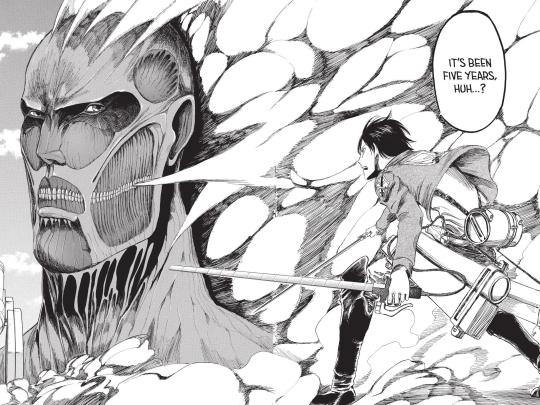
I've been mulling over Attack on Titan's ending and how I'd rate the whole story from all kinds of angles and I've reached the conclusion that above all else, the ending is really fucking annoying.
A great or a terrible ending would help me make my mind up much more easily.
If it's great, it's great. If it's terrible it's a good story with a terrible ending.
But instead, it is a mixed bag: there are things about it I like a lot and things about it I don't like.
It is a very common belief that the ending is paramount to a story's quality, but I've found that this is not really true for me. My favourite anime ever pretty much doesn't even have a proper ending. My needs for an ending basically encompass some sort of sense of closure and that's about it.
Especially longer-running series often either make the journey worth it just by being as long as they are (so a pretty generic ending is okay) or fall off in quality long before they are done. But AoT is neither of these for me.
AoT in this sense is complicated for me because I can't decide whether the ending impacted the quality of the story or not depending on which aspect of the ending I focus on.
Some details make it immensely satisfying to me and some details sour it a little bit.
I think right now the good and bad things balance out so in general nothing changes about how I view the story overall.
In basics, I really like the emotional core of Attack on Titan, but I've always found it flawed on the technical level.
I'd give the story a 10 just for how much it emotionally engaged me and made me care. This story is the reason why I started this blog and I became active talking about media in the first place.
For a time I was losing the sense of fun of being a fan: people just became really hostile when discussing stuff.
But this past week or so has been incredible in my inbox, reminding me of the highs of being a fan, with so many wonderful messages.
Other stories have made me more angry, made me cry more or laugh more, but AoT made me feel the biggest spectrum of feelings.
No other story has made me do this, at most I only became a member of various forums as a random member; I didn't create a blog with the aim to talk about one.
From a technical level, I would give it a 6-7 depending on the section of the story.
The foreshadowing for various twists is pretty loose from start to finish, there is a bunch of redundant scenes all over the story and the pacing can be really uneven. It is not nearly as *well-crafted* of a story in my eyes as I see people praise it to be.
The art is a pretty huge mess at points, too.
I think sometimes the fact that this is the author's very first actual long-running story very much shines through. I think only a beginner would dare to employ historical imagery as bluntly as Isayama did, too, for example.
But to me the emotional core is magical.
The average of these two aspects, emotional and technical, would be around 8-8.5.
But at the same time, when I finished that last chapter I felt like I couldn't rate it and this has rarely happened to me.
I've kind of slowly distanced myself from number ratings in general because consuming media is a very emotional and personal thing and exploring it via positives and negatives feels much more apt.
From that perspective, I think the story is incredibly emotionally intelligent and understands humanity really well.
Stemming from that in turn, I think themes are the strongest aspect of the story next to characters. While I think the story faltered in a some instances when it came to characters, I think the themes mostly stood tall all the way through.
I think it ended up giving answers to and looping back to ideas it started with: seeing the good in the cruel world, facing humanity's unending desire for conflict and need to survive, living without regrets, learning to see the world in more complex shades of gray rather than black and whites and learning to do the right thing when needed.
As a mystery box, it does answer pretty much all of the big mysteries of the story and I think I don't really take issue with any of the big answers except maybe one very specific one. The numerous twists throughout the story range from absolutely genius to fairly typical. Again, the foreshadowing gets a lot of praise when it comes to this story, but I think a lot of the story actually isn't planned. Isayama just uses some details in clever ways to make it seem like it was planned.
I think that is a skill in itself that never gets nearly enough credit, but in the end, I think that is the weakest part of the story along with the world itself.
I like the walls themselves and I really like some of the Titan designs, but other than that I never had much interest in the world of AoT on its own. It always has to be connected to characters or themes for me to care. The crystal cave, time sand dunes and certain Titan skeleton are the most interesting settings in the story for me in that sense.
I think it does also fall in the pit of some pretty frustrating dark fantasy tropes, most specifically with a certain blonde female character who had one of the best character arcs in the story that was kind of just thrown under the bus.
It can't quite escape the pitfalls of that genre and it just so happens to be my favourite genre of story, so I constantly see excessive shock value rape, forced pregnancy and gay erasure happen in stories that I think are great otherwise. It's frustrating.
I hoped AoT would be better than that because for so long it was, but it didn't end up being as such.
But at the same time, I think most of its female cast still ended up being pretty great and did some pretty fun archetype-defying stuff. It's a pretty strange dichotomy. It is actually much better than most dark fantasy, but not quite there yet.
This is actually true for the male cast, too, I think. It does some fun playing around with all of the character archetypes.
The story's action scenes are thrilling and some of the action setpieces are really memorable. The final arc really shines in that sense to me. As a horror spectacle it is especially excellent.
Despite sometimes coming across as narmy/unintentionally funny, it still somehow manages to make the Titans a credible threat and this is true throughout the entire story, for different, evolving reasons.
I think the Titans have become iconic for a reason and never lost the luster throughout any of the story.
Along with that, my final point is that it is one of the few stories that sets up a kill 'em all setting that actually kills major characters with substantial focus and commits to it. It also doesn't kill too many characters where no character ever gets to actually develop.
So, considering all of what I listed above, what would my general thoughts be?
I think it still is a story worth checking out.
Personally I obviously love the story as a whole.
But I think any fan of dark fantasy/sci-fi could get a bunch of entertainment out of it: above all I think it is an extremely digestable series.
It's sometimes a very dense read, but I never felt it was a "hard" read. It's a very dark story with a lot of horrible things happening, but I never felt it was difficult to get through even in its darkest of moments.
My favourite characters ended up being Gabi, Reiner, Eren, Pieck, Armin and Annie. Zeke and Hange get a shoutout, too.
My favourite chapters ended up being 71, 82, 100, 122, 131 and 137.
Who are you guys' favourite characters and what are your favourite chapters and why?
Send me an ask explaining why for fun! (Or ask me for my reasonings?)
#Attack on Titan#Shingeki no Kyojin#AoT 139#SnK 139#AoT manga#SnK manga#AoT#SnK#Eren#Mikasa#Armin#Levi#Eren Jaeger#Eren Yeager#Mikasa Ackermann#Armin Arlert#Levi Ackermann#Reiner Braun#Reiner#Annie#Annie Leonhardt#Colossal Titan#Bertholt Hoover#Bertholdt Hoover#Hange#Hange Zoe
45 notes
·
View notes
Text
FULL REVIEWS: “Lost In Language”
Lost in language and I don't know much. Was I thinking aloud and fell out of touch? But I'm back on my feet and eager to be what you wanted.
Seriously? Nothing? You guys have never heard Air Supply? I mean, they’re old AF but still. It’s a funny pun. Whatever.
Back in the day (like it was so long ago) I didn’t know what to expect from this episode. The only thing I caught from the description was library, but hoo boy, we got so much more!
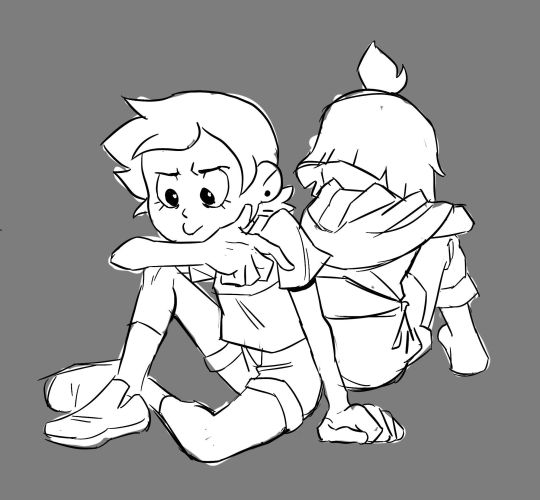
I love the cold opens to this show. It always reminds me that Luz is a silly ass hyper fangirl who still wants life to play out like it does on TV.
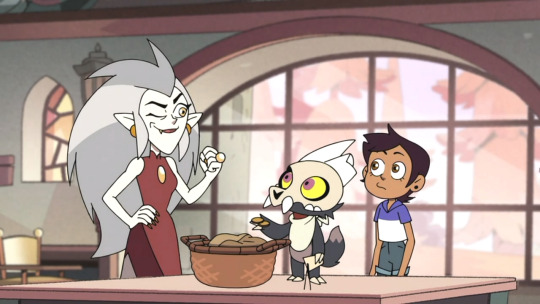
“Learning about love and life through the eyes of a child.”
Spoken like a true person who have never done any actual babysitting. The Bat Queen gets her own soft intro for another episode, which I’m noticing more and more re-watching this show. She pays Eda to watch her baby in exchange for a butt-ton of money. Eda, in classic Eda fashion, would rather not split the cash with Luz and gives her an errand to run so she doesn’t have to do it.
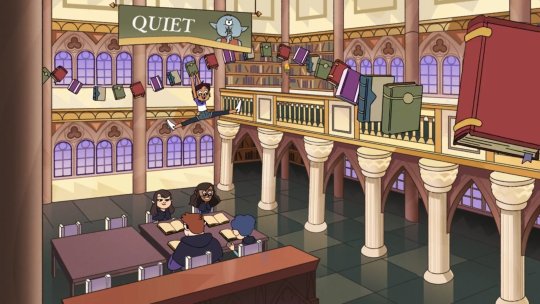
I don’t know about you guys, but liked going to the library when I was a kid. It was the only way I could play computer games or go on the internet. Getting online is the easiest thing in the world today, but when I was a kid, it was a luxury my parents couldn’t afford. And dumb-dumb kid me didn’t know that you can borrow movies and comic for free at the library too. That’s how I saw Jaws for the first time.
The library at The Boiling Isles is almost exactly what I expected. Kinda like the Hogwarts library, but with a lot more teeth and eyes everywhere. Luz has a bunch of fun just messing around, until she stumbles upon the cutest goddamn thing ever!
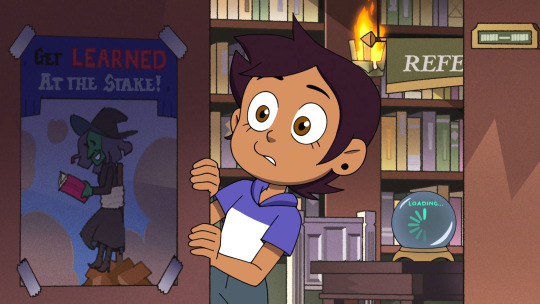
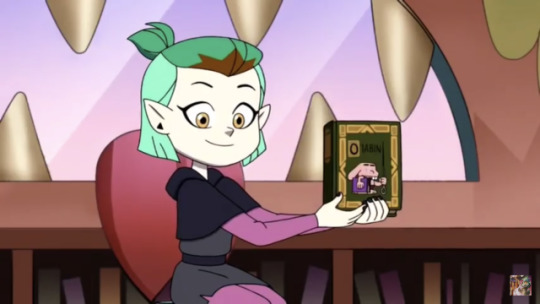
Amity reading to kids at the public library in her free time. My god.
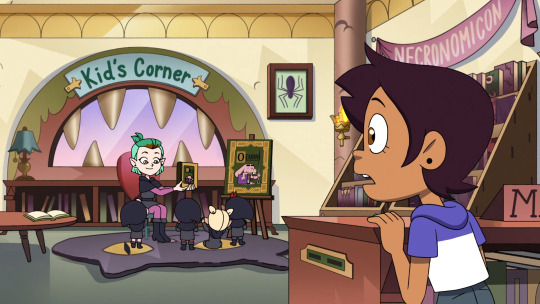
I’m with Luz here. Holy hell, I did not see that coming. I thought Amity was the rival character, the Draco Malfoy of the show, the reluctant ally, the jerk with the heart of gold DEEP in there somewhere. Instead she’s at the Kid’s Corner reading her favorite childhood classic to toddlers. I didn’t know there were angels in the demon realm.
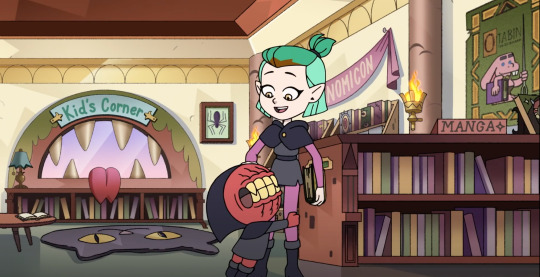
Stop. Stop! You’re already cute.
Seriously this moment made me go “aw” and laugh at the same time. It was weird. Also how does this library have a manga section? Do they import these books from JAPAN in the HUMAN REALM? Is there a publishing company that acts as the middleman? Or are these just the books that the trash slugs ended up barfing on the beach somewhere? I’m thinking too hard about a throwaway joke in the background. Big brain hurt.
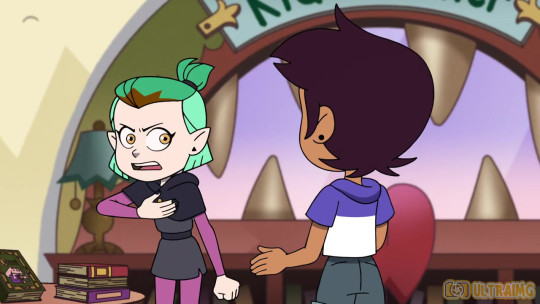
AND back to reality...
Luz tries to extend the hand of friendship to Amity and Amity rejects it. I have...thoughts.
First, they this up with another parallel to Azura in the beginning of the episode. I get it. It’s a theme that they are doing, but I would have rather have Luz try to befriend Amity because she wants to, not because Azura did it. It’s not the only reason she does it, but it does kinda bug me a bit. It kinda goes back to Luz wanting life to play out like a story.
Also, a part of me thinks that this is something Amity likes to do alone. Her way of getting away from everyone else and just do something that she enjoys and makes her feel good. We have no proof that it gives her extra credit, so she could just use that as a way to save face. She seemed so happy to do it too.
Finally, you know what this else this reminds me of? The Karate Kid and Cobra Kai. There’s a popular fan theory that has been around since the eighties that if you look at The Karate Kid from the rival’s perspective, the protagonist is the bully. I’m more than sure that’s what going on here. From Amity’s perspective, Luz just gets her into trouble. We’ll get more into that later.
Luz walks off dejected and we get the second big surprise to punch me in the face.

Holy hell, why the fuck are you two so goddamn fucking pretty? I mean, holy shit, look at these two. My god. And ERICA LINDBECK as Emira? Jesus Christ, I’m going to be feeling things I shouldn’t be feeling in places I can’t say!
Joking aside, we get one of our first full introductions that didn’t come with a soft intro from a previous episode. Enter Emira and Emira, Amity’s older siblings who in true sibling fashion like to give Amity a hard time.

“Hey, mittens!”
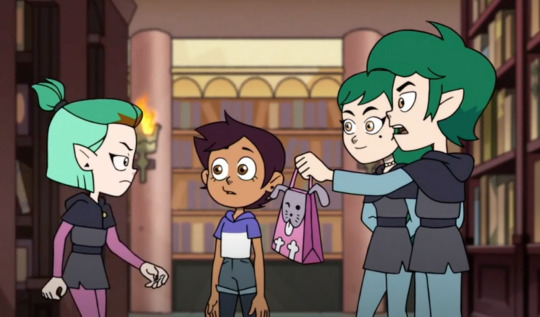
This seems normal at first. Siblings always rib each other. No big deal.
Amity storms off. The twins introduce themselves proper to Luz (and the audience) and they mess around for a bit.
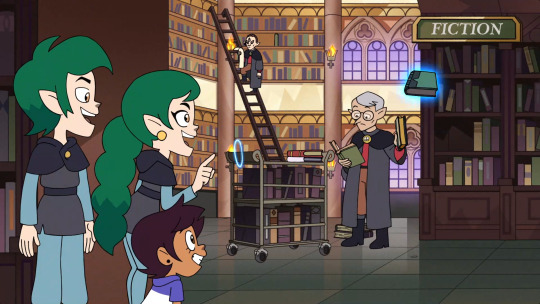
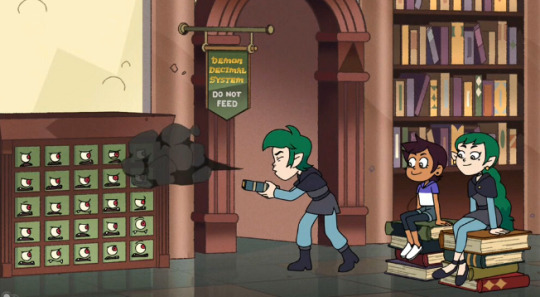
In fact, they have so much fun messing around with Luz that they decide to invite her back afterhours to check out The Wailing Star. Luz thinks that this is a great way to get on Amity’s good side by befriending her siblings. Why she would think this I have no idea.
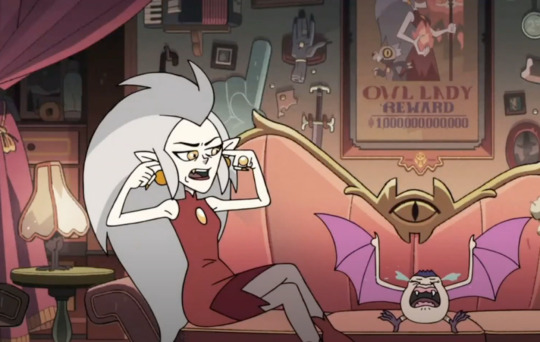
Meanwhile the B-plot continues its adventures in babysitting. I don’t like using the word filler (so I won’t) but this B-plot is really just for two things: setting up Escape of the Palisman and jokes. It does both. No harm, no foul.
Also the twins said for Luz to meet back at midnight and Luz was at The Owl House for like a hot second. There’s like a huge gap of time there. What did she do until midnight? Whatever. If it was important it would have been animated.
Also also, I love all of Luz’s little saying in this episode. She does it a lot but they cranked it up in this episode. Featuring great hits like:
“This sour lemon drop has a hidden sweet center.”
and
“I thought we were as cool as cucumbers but we’re as sour as pickles.”
and my favorite
“Call me a library book because they were checking me out.”
I hope they keep doing that.
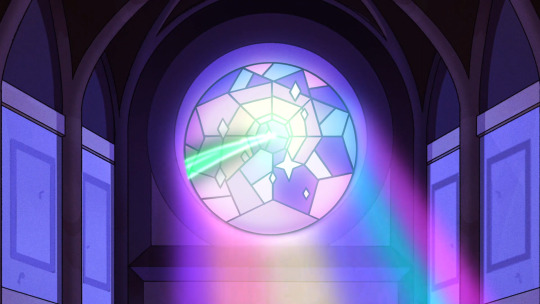
Back at the literal Wailing Star (I laughed so hard), The twins and Luz discover that The Wailing Star brings the content of the books to life. Does that work for all books in The Boiling Isles or just the library? Enough. No more big brain. The three proceed to...mess around some more.
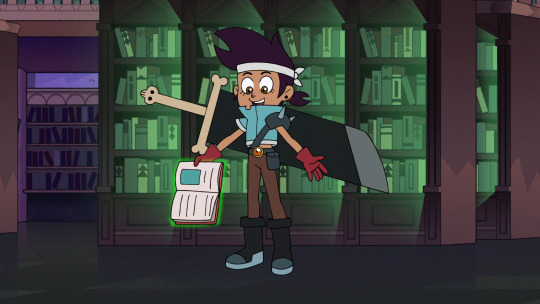


The twins discover offscreen (Really? Really.) that if you edit the contents of the book, you change what comes to life. Then the twins reveal their true objectives. Apparently, Amity has been tattling on the twins whenever they cut class or do whatever it is that they want. They’ve decided to look for her secret little hideaway (that they somehow know is in the library), find her diary and post all the pages all over school to teach her a lesson.
Um, fucking no.
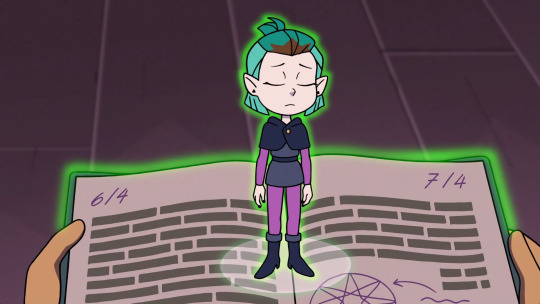
And here we enter the true lesson of this episode and probably the reason why Hecate is draw with two faces. People being more than just what they appear to be at face value.
Amity appears to be the bully character of the show, and while she did bully Willow, Luz and King, there’s more to her than that. Amity is lonely. As a fellow person who grew up lonely, trust me. I can tell from a mile away. She puts pressure on herself to be the best at whatever she’s doing and to be the best. She hates that she follows the rules but people like her siblings seem to get rewarded for breaking the rules and doing whatever they want free of consequence. She sees the double standard that they live by and it angers her. But at the same time, everyone seems to give the twins a free pass so she can’t do anything about it.
Even worse, there’s no one for her to confide in. It wouldn’t make it better but it would make it easier for her to just vent and get the bullshit out of her brain. She doesn’t like her friends and the one friend she did like...that’s for another episode. Hence, the diary. Amity is a big ball of frustration and loneliness. I know because I grew up in a very similar way.
When you’re forced to keep your anger inside you, you lash out at any little thing that bothers you just to ease your frustrations. It doesn’t make it okay but it’s the only way to cope sometimes just to get by.
The twins on the other hand seem like everything you’d want in a friend. They’re fun; they like you; they’re attractive; they’re attentive. But in reality, they live in a world where they believe consequences and accountability don’t apply to them. And they’ll do anything to keep it that way. Even humiliate their sister.
Luz seems like a happy-go-lucky, friends to all things kinda person, but she can also be innocently insensitive. She just does things hoping they turn out the way they would for Azura without considering how the people around her would feel about it.
It doesn’t make any of these characters two-faced. We just are different things to different people.
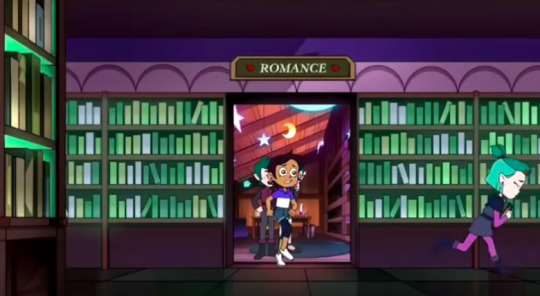
Amity discovers what’s going down and Luz (being the empathic person that she is) decide to try to go talk to her.
Then I’m reminded that this is a horror-comedy.
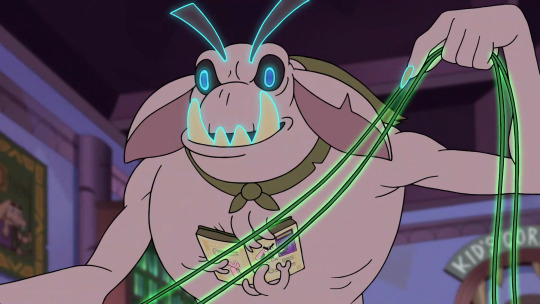
My god, you’re ugly.

One climax later (don’t laugh), and Luz and Amity try to make amends with each other. They both have to think about how they’ve been treating the other, earning the title of bully or not. They’re not friends yet but this is...better.
FINAL SCORE: 5 - Loved it.
Damn, The Owl House is one a roll. That’s what? Three 5 scored episodes already? Hot damn. This episode was fun but it really hit hard with the character work on Amity. She quickly became one of the most interesting characters and a fan favorite. And the third act provided a good amount of horror to call this a horror comedy. The B-plot is fine but probably one of the weakest only saved by several funny jokes. This is one of those episodes I kept coming back to and a favorite to watch.
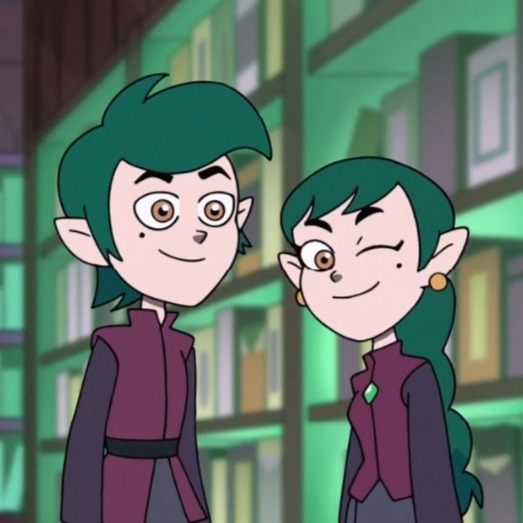
Could you two please not? I’m gonna get in trouble.
86 notes
·
View notes
Text
Movies I watched in March
Thought I’d chronicle the films I’ve been watching over the March period, from the 1st to the 31st, and how I’d rate them. If you’re looking for something to watch, perhaps this will help. A lot of these movies are available on streaming services also.
The Wolf of Wall Street (2013) - 10/10
I hadn’t watched this in a couple of years but I was blown away. Peak Scorsese.
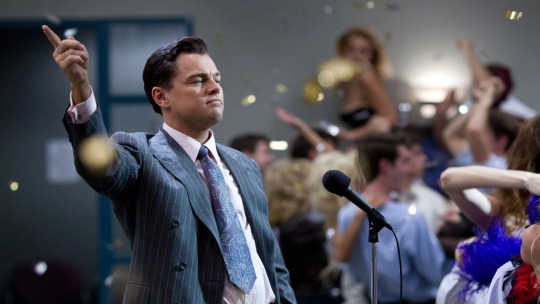
Rushmore (1998) - 7/10
Not the best Wes Anderson movie for me but still fun.
Lion (2016) - 8/10
I discussed this at length on my podcast: The Sunday Movie Marathon. Great movie!
The Grand Budapest Hotel (2014) - 10/10
Now this is one of the best Wes Anderson movies. I discuss this more on The Sunday Movie Marathon. Fantastic, funny and I watched it twice because it’s so much fun.
Inception (2010) - 10/10
Discussed on The Sunday Movie Marathon. Best Christopher Nolan movie for me, Inception is just breathtaking.

The Life Aquatic With Steve Zissou (2004) - 5/10
This might be Anderson’s weakest film (at least from what I’ve seen) but it’s still not as bad as a lot of directors at their worst.
The Royal Tenenbaums (2001) - 10/10
I was really on an Anderson binge in March. The Royal Tenenbaums is one of the most wholesome movies I’ve seen and certainly one of his best films.
Rome, Open City (1945) - 4/10
This was filmed in Nazi-occupied Italy and from that premise, the film enticed me. Despite having some interesting qualities, I do feel that initial pull is most of what the movie has going for it.
The Prestige (2006) - 7/10
I showed this to my brother and for what it’s worth, he enjoyed it. I do think this is one of Nolan’s weaker efforts but considering how much I like it, that speaks a lot to Nolan’s filmography as a whole.
Nostalgia (1983) - 10/10
I watched Nostalgia three times in the space of a week and reviewed it on The Sunday Movie Marathon. It’s phenomenal.

Kangaroo Jack (2003) - 1/10
Another one I watched for the podcast. Kangaroo Jack is truly terrible and it upset me a great deal. Avoid this movie.
Stalker (1979) - 10/10
Another Andrei Tarkovsky movie (director of Nostalgia). I watched this again during the day before my second watch of Nostalgia and while it’s hard to compare such different movies, I enjoy Stalker more. It’s a staple of Russian cinema for a reason.
Four Lions (2010) - 5/10
Watched for the podcast. I didn’t really gel with this comedy but it would certainly appeal to someone who enjoys the humour, as my co-hosts did.
Revolutionary Road (2008) - 6/10
This Sam Mendes joint was a tad too melodramatic but still boasted some great performances from Leonardo DiCaprio and Kate Winslet.
Metropolis (1927) - 6/10
This silent film is a staple in cinematic history. Its themes are as painfully relevant today as they were in the 20’s, yet despite that I found a lot of it to be intensely boring. After it hit the hour mark, I started playing it at 1.5x speed.

Crimson Peak (2015) - 4/10
A lot of great set design and costumes and colours, yet the story itself was madly uninteresting.
Eternal Sunshine of The Spotless Mind (2004) - 10/10
Who doesn’t love a good movie written by Charlie Kaufman? I reviewed this on The Sunday Movie Marathon and after a third watch, it is as fascinating as it is gut-wrenching.
Godzilla (2014) - 3/10
If you wanted to see Godzilla fight a bunch of monsters for two hours, then this is not the movie for you. There’s maybe about ten minutes total of on-screen Godzilla action and considering that’s really all anyone’s watching this for, it’s amazing the titular sea lizard occupies so little of the movie.
Prisoners (2013) - 10/10
Brilliant mystery thriller by my favourite director, Denis Villeneuve. Discussed on the podcast.
Eraserhead (1977) - 7/10
David Lynch’s debut feature film went down in my estimations this time around. You can listen to why on The Sunday Movie Marathon. Still, Eraserhead is a very good movie.
Raiders of The Lost Ark (1981) - 6/10
The first Indiana Jones movie proved to be a fun romp and Harrison Ford plays the character beautifully. I’m just not a big fan of Spielberg and his average verging on pretty good but rarely ever great movies. Perhaps on a second watch, I may enjoy this more.
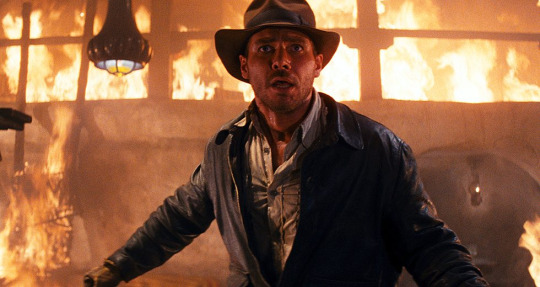
The Seventh Seal (1957) - 9/10
Watching this movie again was so much fun. So far, it’s my favourite Ingmar Bergman film. It’s a celebration of life and love, with an underlying sense of dread as death looms ever-present.
Indiana Jones and The Temple of Doom (1984) - 5/10
I can tell why this generally looked on as the weakest in the trilogy. Harrison Ford is still great but the movie dragged a lot and felt more like a bunch of things happening for the sake of it rather than a fun action/adventure.
Indiana Jones and The Last Crusade (1989) - 7/10
The Last Crusade was a lot of fun and maybe it was Sean Connery’s inclusion, or perhaps the bottle of wine I drank through the movie elevated my enjoyment. But alcohol aside, I still believe this to be the best in the series.
Justice League (2017) - 2/10
People really weren’t kidding when they said this was bad. I watched this in preparation for the Snyder cut and I was not happy. This took years off my life.
Zack Snyder’s Justice League (2021) - 3/10
Barely any better and double the run-time of the original. I discussed this on The Sunday Movie Marathon and I was certainly not impressed. Better luck next time, Zack!

The Truman Show (1998) - 10/10
Brilliant movie and one I would highly recommend for a stellar Jim Carrey performance. This was another recommendation for the podcast.
Eighth Grade (2018) - 7/10
I was impressed with Bo Burnham’s debut feature. This is a coming of age story centred around a young girl growing up in the modern world and how it can affect the youth of today. Burnham shows a deep understanding of youth culture and a real knack for filmmaking.
Bad Education (2019) - 8/10
A real “yikes!” movie. If you want to learn a bit about the embezzlement that took place in an American school back in the early 2000’s, you need not look further than this tight drama with fantastic performances from Hugh Jackman and Allison Janney.
Twelve Monkeys (1995) - 8/10
One of the only movies where the time travel makes sense. I recommended this for The Sunday Movie Marathon and it’s pretty great.
Ready Or Not (2019) - 7/10
Despite a premise that is not wholly original and a super goofy third act, Ready Or Not is gory, violent fun with a lot of stylish art direction.
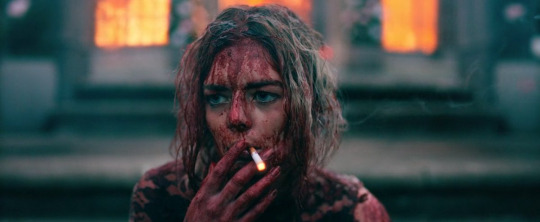
Dead Man (1995) - 3/10
Recommended on the podcast. I really did not get a lot out of Dead Man. It’s a very slow movie about Johnny Depp going through the woods and killing some people on the way, but it’s two hours long and hugely metaphorical and sadly it just didn’t connect.
Misbehaviour (2020) - 6/10
A big draw for me in Misbehaviour is Keira Knightley; I think she’s a great actor and I’m basically on board with anything she does. I’d been wanting to see this for a while and I was shocked to see just how relevant it is (being set in 1970) to the world we find ourselves in today, where women are still fighting to be heard and to be treated equally. While the film is not spectacular, I still got a lot from its themes, so recently after the murder of Sarah Everard and how women are being treated in their protest.
Dr. Strangelove or: How I Learned To Stop Worrying and Love The Bomb (1964) - 7/10
I was surprised at just how hilarious this early Kubrick movie is. While I can’t say it floored me or took any top spots, it’s still a great examination of the military and how they respond to threats or try to solve problems and the side of war we don’t often see in films: the people in the background sitting in a room making crucial decisions.
Taxi Driver (1976) - 10/10
Wow! I can’t believe I’d never seen this before but I’d never really had access to it. Taxi Driver is a beautifully made movie with so much colour and vibrancy. De Niro puts on perhaps his best performance and Paul Schrader’s timeless script works miracles.
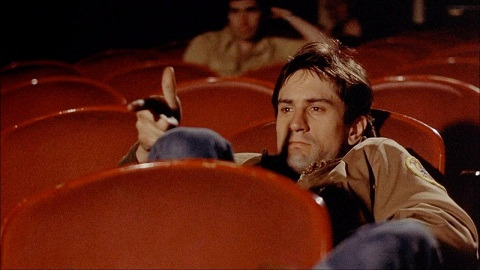
Sleepy Hollow (1999) - 5/10
Classic Tim Burton aesthetics in a pretty by the numbers, almost Supernatural-esque story eked out over an hour and forty minutes.
Seaspiracy (2021) - 6/10
Everyone’s going crazy over this documentary and I agree it tackles important issues we’re facing today surrounding the commercialization of the fishing industry, but a lot of what’s presented here is information already available to the public. The editing feels misplaced at times and the tone is all over the place. Nonetheless, it’s still quite fascinating to see good journalism being done in a way that exposes this side of the industry.
Pirates of The Carribean: The Curse of The Black Pearl (2003) - 8/10
Super fun and a great first instalment in a franchise that sadly seems to have peaked at the first hurdle.
My Octopus Teacher (2020) - 8/10
Great cinematography and a lovely premise, this documentary has garnered an Oscar nomination and I can see why.
The Sisters Brothers (2018) - 8/10
A really solid western I was happy to watch again. It’s a shame no one really talks about this movie because it is excellent with stunning visuals and great performances.
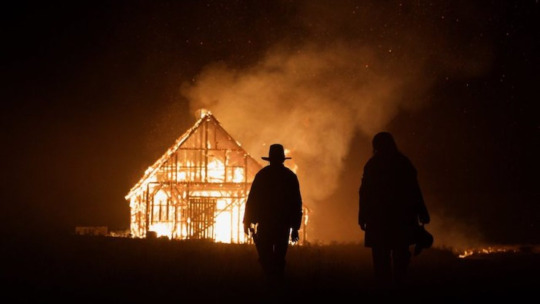
Pirates of The Carribean: Dead Man’s Chest (2006) - 5/10
A strangely massive drop in quality from the original. If I didn’t like the whole concept of this franchise so much, I might have had a worse time.
Reservoir Dogs (1992) - 8/10
On a second watch, Tarantino’s first feature is still wildly impressive.
Life of Brian (1979) - 7/10
This is perhaps my third time watching Monty Python’s Life of Brian and it’s still incredibly funny, however it never manages to measure up to its predecessor (and one of my all time favourites), Monty Python and The Holy Grail.

#march#movies#film#wrap-up#monthly#follow for more#the wolf of wall street#rushmore#lion#the grand budapest hotel#inception#the life aquatic with steve zissou#the royal tenenbaums#rome open city#the prestige#nostalgia#kangaroo jack#stalker#four lions#revolutionary road#metropolis#crimson peak#eternal sunshine of the spotless mind#godzilla#prisoners#eraserhead#raiders of the lost ark#the seventh seal#indiana jones and the temple of doom#indiana jones and the last crusade
41 notes
·
View notes
Note
I bet you don't know that Fruits Basket season 3 has won the first place beating FullMetal Alchemist Brotherhood. I think it is well deserved!
wow! you're serious? well.. good for them, I guess.
I watched both Furuba & Fullmetal Alchemist Brotherhood (FMAB) & while Furuba's themes, content & core elements are my kind of story-telling & is way closer to my heart than FMAB, I'll never ever place furuba the anime above FMAB in terms of anime-writing & presentation.
I know FMAB differ from its manga & I know manga fans were not satisfied with some issues that really make a difference, but not once during watching the anime did I feel it was contradicting itself or its own plot, or minimizing any character or the eps are rushed in favor for silly over exaggerated drama. FullMetal Alchemist Brotherhood the anime was balanced is such satisfying way that left me in awe so much that I recommend it without needing to read the manga to properly understand the characters.
Above all, FMAB portray of women & female characters is one of the best presentation in anime! no need to glorify these women or make them robotic or strip them from their femininity or dumb them down or cut from their screen time & story in favor for the male characters! They were written the same way as the male characters with balanced doses of scene exposure (personal spotlight), intelligence, logic, endearing unique characteristics & moderate dose of silly stupid antics & dark sins that humanize them.
-Furuba se03 is the best among the 3 furuba seasons, but furuba is not balanced at all. never was since its beginning till its end. It's a show/anime centered around the angelic motherly care of an orphan girl healing a whole clan & this girl herself was rarely treated as an independent character & I say this while loving tohru deeply. She's the weakest written character due to the tiniest space she's allowed to be..well.. a character with issues like the others. Overall.... Furuba's male characters are way better written then the female... Even akito was reduced to a shallow antagonist with weird villain animation for so long, had one ep to humanize her, then quickly given 3 doses of tohru's wisdom before she atoned. ( it was 2 doses actually, but I'll include the hug).
I love furuba. it is a good anime & the core story is great which is why I'm trying to read the manga, cuz I refuse to believe someone who constructed such good story fails miserably in writing its main female character. I admit that tohru might still be behind the two boys in the manga as well in terms of depth & core issues, but I'm counting on her being 10 times better than the anime tohru. I'm looking for a tohru that is allowed time to dwell in her issues & battle her trauma internally before the climax, cuz i'm so tired of her being the fixer mother of men! Se03 has tiny scenes of tohru being an independent character starting ep 6 onward, but very tiny & with not much depth before her "growth" kicks out at ep, 9.
Also, aren't these ranking & awards created for marketing reasons & are mostly voted by fans or marketing teams? For example, Game of Thrones, se7, ep 6 ,where John snow & co. go to hunt a white & defy all logic only to set yhe plot so the white king get a dragon for aesthetics, won 3 awards as I heard!!!
I'm happy you are satisfied with furuba winning 1st place, anon. I'm really happy for you<3. kindly, dont let my criticism steal your happiness. Your opinion matters to you shouldn't be affected by ppl's opinion online. <3
#fruits basket#anime only#sleepy paper#lovely anons#asks#responding paper#fullmetal alchimist brotherhood#anime awards#anime ranking
16 notes
·
View notes
Text
Review! Adventure: (2020) Episode 67: The End of the Adventure

In this episode, among all of Negamon’s terrifying forms, it decides a shadow rivaling Omegamon is the scariest.
The common template for Digimon finales of half climactic action and half emotional epilogue offers some intriguing possibilities for this series. The climactic action part goes without saying: whatever stops are left will be pulled out and it’s going to be the kind of wild action sequence the show’s excelled at. But it’s hard to go without some sort of resolution as the kids say farewell to the Digital World. How do you say goodbye to a cast we never really met in the first place? It could be the same hollow statements we’re used to, or they could cram a bunch of real world details we should have discovered ages ago. Instead it’s split halfway, with sights a little more telling than we’re used to, but without pretending this show was anything different than what it was.
After tussling with multiple forms of Negamon, all abominations of tentacles and eyes, Omegamon dives into its main core for the final showdown. And Negamon, master of horrors… solidifies into a form the same size as Omegamon, only shadowy. It’s possibly the least intimidating thing it could muster. It’s also a weird show of deference, like Negamon would rather fight as equals rather than as something larger and awe-inspiring. It makes for a hell of a final one-on-one clash that delivers the kind of fight we hoped for, but the psychology is poorly considered and the form in many ways betrays Negamon’s concept.
Once Omegamon and Negamon run through the string of “evenly matched overpowered robot duel” tropes, eventually ending up in space because why not, the usual spur of energy from the angels and the usual refusal to quit from Taichi and Yamato leads to Omegamon Alter-S… the usual mode change everybody expected. It makes quick work of Negamon, but makes an observation that other Digimon seasons have only danced around: in worlds where Digimon are reborn: doesn’t that apply to the villains?
It varies by world, but you probably should wonder about the fate of the Dark Masters, Lucemon, Bagramon, and the like. This time it’s attacked head on. Omegamon recognizes that the power of rebirth Negamon grew such a disdain for allows it another chance to recreate itself, perhaps this time without the corruption that led it down this path. If there has been a recurring theme this series, it could be the exploration of renewal and history repeating itself.
The falling action starts out on an auspicious note, with the kids left in a weird binary space where everyone can chill with their partners for a second. They’re sweet, quiet moments, but nothing remarkable. And suddenly it’s over, leaving you wondering if that was it for the kids in the Digital World, perhaps even with their Digimon. Meanwhile, the following scene of Wisemon passing on the story to the baby Digimon is a wonderful additional to the formula. Like the holy war before it, it shows how this adventure is destined to become part of the world’s lore, to inform and guide the heroes of the next crisis that will inevitably come along.
As for the heroes of this one… they just go back to their lives. Not knowing much about them lives hampers a few of the shots, particularly Sora and Joe’s. But for everyone else they take what little we were given and roll with it. Takeru and Yamato get a rare real world visit. Mimi puts her entrepreneurial spirit into action. Koshiro’s on her payroll, devising a way to open his own gate to the Digital World. And Taichi gets a moment in the shade, a chance to enjoy some peace and quiet, maybe even out of the limelight for a change. That he’s still in the Digital World is only brushed on, appropriate as he’s not the first Digimon protagonist to make that call, that he didn’t have any specific grievance that made him want to avoid the real world (at least that we knew of), and he wasn’t that convincing as a human child anyway. It’s a good spot for him.
It’s almost a footnote that the Digimon stayed with them, remarkable since that only happened once in the first six seasons. But instead of wondering about the implications of Digimon in the real world, they leave the kids alone with their sassy pets. Other kids saw it all; they’re fine with it. They keep it simple, while still offering up a clean resolution to everything, combined with a final battle that lives up to the hype. With all the disappointments of the series baked in, the least it could do was manage an ending within its means. To that, at least, we can be happy it was successful.
My Grade: A-
Loose Data:
Hope you weren’t playing a drinking game taking a shot for every Our War Game homage. The episode leads off with Omegamon flying through a network-like tunnel and it never really lets up at any point in the battle.
They make a big show of the other six occupying Negamon’s outer body to weaken the core, but there isn’t much correlation shown to suggest that affecting much. But it’s nice that the other six got to feel useful in the final battle. And while it’s certainly appropriate that Seraphimon and Ophanimon are leading the way, it is unusual to think about Takeru and Hikari heading up the troops.
Considering it’s the first time we’ve had a good Digimon introduced stronger than the one that showed up in episode two, Alter-S didn’t get a whole ton of screentime. He showed up, more or less one-shotted Negamon, then was back to regular Omegamon before the end of his monologue. As far as midnight hour emergency power-ups (Crimson Mode, X7 Superior, that sort of thing), this is one of the weakest.
Omegamon talking about “endless potential” sure hits differently after Kizuna, doesn’t it? He’s talking more about Digimon in general while Kizuna was about the limitations of the Chosen-Digimon partnership, but still…
Given the season’s dedication to showing the Digital World outside of battle, the montage of locations carrying on with life is great, and lined with little sights like BanchoMamemon graduating finishing school, the Mimi statue at the gem mine, and Petaldramon, Andromon, and Guardromon all still petrified under flowers.
One cute little touch/nod to the original series… Yamato and Takeru are meeting in Shibuya.
The digital gate Koshiro is trying to create resembles the weird pop-up he received in episode one that we all thought was going to be interesting and relevant and we never saw again.
And finally, congrats to Leomon for surviving a series! His reward is spending the rest of eternity helping Wisemon babysit.
See reviews of every Digimon episode at Digimon: System Restore! Support the site by joining our Patreon!
9 notes
·
View notes
Text
Imposter Factory: I Beat It (Non-Spoiler)
So I finished Imposter Factory, the sequel to Kan Gao’s To The Moon and Finding Paradise games. I have been in love with To The Moon since I played it all the way back in 2012, and I have never stopped loving it, no matter how many times I have replayed it. However, I only played Finding Paradise once, and while I thought it was just as good as its predecessor, I had a harder time connecting with it as I did with To The Moon, even though its themes were more relatable to me as a person. Still, I was excited for Imposter Factory; Kan Gao never fails to make me laugh, think, and cry in the span of a few moments, and the few images we’ve gotten over the last two and a half years since its announcement have only made the hype grow. So of course I forgot about it until release day, and in a panic I bought it and played it right away. Naturally.
The only two things I knew going into Imposter Factory were twofold: 1) the basic synopsis (which even that I doubted) on the Steam page, and 2) the concept that IF’s main themes were “in-between” TTM and FP. Other than that, I was going in blind, and I think that’s for the best. The game is at its best when you are surrounded by the mystery of everything going on. What is this mansion you found yourself invited to? Who is this mysterious woman who is lurking around the place? And whose is murdering this lovely old couple with very wealthy connections? It hits the Agatha Christie vibes just right. You never know what is going to hit our intrepid hero, Quincey, next.
But like the Steam page says, that is only the first third of the game. I won’t go into too much detail about the other two-thirds of the game, but I will say that the second half is more or less what you would come to expect from a Kan Gap game: exploring memories, collecting orbs, and moving on to the next memory. Except this time, there are no bickering scientists one-lining their way through a person’s life- instead, Quincy is the one in control, and this alone is an interesting concept. Quincy has no clue as to where he is and what these orbs do, and that makes for an interesting twist on the formula. We aren’t following indifferent but sympathetic workers, but a person with a kind heart, and so his reactions to the memories he witnesses are much more raw and emotional...when he reacts. There are times where he just seems emotionless, even when he really shouldn’t be. That’s a shame, because Quincy is a fun guy to hang out with otherwise. He actually cracked me up more than Dr. Neil Watts has, and Neil is a comedic king in these games. Just it feels like he probably should’ve had a companion with him to bounce off of during the second third of the game, to add some levity to the proceedings. While a little cheesy and unnecessary during the serious parts, Rosaline and Neil were fun characters to hang out with, and its a shame they’re not controllable this time around.
That isn’t the only issue plaguing IF. For one thing, there isn’t as much interactivity with the environment as there is in the previous games. You barely talk to NPCs and there are barely any items to click on and read funny descriptions on. Also, the “memento” system is done away with: the orbs break open a barrier and you move on to the next section, no puzzles to solve to progress. I will admit that I didn’t miss the puzzles as much, but I did miss trying to find the next memento and seeing where the memento leads to; they gave a break from all the story we’re constantly surrounded by. These, along with Quincy’s relative silence during the second third, means IF has a more serious tone to it than the previous game before it, and while it does make it stand out from TTM and FP, the game also feels less memorable than those other two. TTM and FP were meme machines and had a lot of quirky moments to break up all the sad. Oh, except for Ricebot. Ricebot and the weird long cat were good.
My final problem with IF, however, is much grander than the other problems I’ve mentioned, but it is unfortunately a spoiler. I will do a spoiler post about IF later, but suffice it to say, it majorly affects everything about the game, and it did affect my overall enjoyment of the game. I know people are going to disagree with me on this, but I have to say what I feel.
Overall, IF was definitely a fresh new twist on the series. The art was spectacular, there was actual animation this time that looked wonderful, I (mostly) enjoyed the new characters and the music is beautiful as always (though sadly Laura Shigihara did not sing anything this time :( though Leafpie did, so check that out). I do think, however, it’s the weakest of the three Sigmund Corps. games. The script isn’t as tight as before and the darker tone means we’re missing some of the series’ iconic humor, but there is still some good stuff to chew on here. I still almost cried again, so that is a good sign, at least.
(Also one note I want to make: Kan said that, like before, IP can be played without having played the other games in the series. I agreed with him when it came to FP, but this time I am going to have to disagree with him on IF: You should at least play Finding Paradise before playing Imposter Factory. I will not spoil why here: let’s just say that there are some things in FP that pop up again in IF.)
EDIT: I HAVE SAID THE SPOILERS. HERE ARE THE SPOILERS. Don’t kill me please lol
#imposter factory#to the moon#finding paradise#kan gao#rpg maker#rpg game#Laura shigihara#imposter factory spoiler#ricebot#undertale#deltarune#oneshot game#dr. neil watts#dr. Eva Rosaline#neil watts#eva rosalene
10 notes
·
View notes